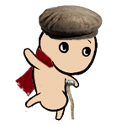|
F. Yugra. Cause every option that replaces Slavs with Finns is a good one.
|
|
|
|

|
| # ? May 16, 2024 17:46 |
|
Alright, I'm caling it. It was close, but the Normans have it. Update soon-ish, a day or two. Feel free to suggest long-term goals beside "conquer the coast".
|
|
|
|
Become Norman cultured
|
|
|
|
Smash the patriarchy.
|
|
|
|
Sindai posted:Smash the patriarchy. Absolute Cognatic inheritance, coming right up.
|
|
|
|
Do it.
|
|
|
|
Unland the Papacy and unseat Catholicism as the mainstream.
|
|
|
|
Stay far, far away from england.
|
|
|
|
Become Norman, take Sicily, become Sicilian, and conquer Rome.
|
|
|
|
Absolute cognatic succession, unseat Catholicism as the mainstream, harass and undermine the pope at every opportunity, form the Empire of Francia and/or the Holy Roman Empire, be Norman cultured, and push the Spanish Muslims back into Hispania. Kind if a tall order, but I'd love to see it happen.
|
|
|
|
Crown an Empress.
|
|
|
|
Any way to get the only female inheritance? That would be cool.
|
|
|
|
NewMars posted:Stay far, far away from england. Yes you are not allowed to cross the channel.
|
|
|
|
Wentley posted:Any way to get the only female inheritance? That would be cool. Enatic inheritance requires modding, sadly. And a large number of interesting [read: not christian/feudal] options like Republics and Nomadic Clans are hardcoded to only function with a male ruler, and a lot of vocal Paradox forumites get very, very angry any time anyone asks for a way to escape or bypass that hardcoding, reducing the likelihood of ever getting it.
|
|
|
|
I'm pretty sure as of Horse Lords that Republics, at least, aren't coded that way anymore. Don't quote me on that.
|
|
|
|
Do not set foot in England unless you have to siege to get a province in continental Europe, conquer your way through Flanders, the various Sunni outposts, and France/Netherlands.
|
|
|
|
Nekomimi-Maiden posted:and a lot of vocal Paradox forumites get very, very angry any time anyone asks for a way to escape or bypass that hardcoding, increasing the likelihood of ever getting it. Fixed that for you. If there's one thing Pdox loves to do, it's troll their misogynistic fanbase.  It's just stuff like Republics were designed before they became more open with their moddibility.
|
|
|
|
This is kinda late but I feel pretty dumb because I don't understand why the one guy getting caught loving the Shah's niece led to him killing Darwesh or if we'd ever seen the name Darwesh before. I'm really enjoying this format overall but that plot point just lost me, like I missed something important.
|
|
|
|
Update 6 - You Can't Say No to Family The Caravan stops at the shore, unsure of where to head next. Their leader, the Elder Darwesh, has gone to meet the sun. They call for a moot to see who will lead them now. As they deliberate and shout angry yells in a myriad of languages, a woman approaches. She is old, but carries herself like royalty, her posture impeccable, and he dress spotless.  : I will lead this Caravan. I know these shores. : I will lead this Caravan. I know these shores.The bickering stops. They stare at the noble woman that stands before them. The younger man speaks first.  : And who are you, traveller? : And who are you, traveller? : I am Sophie Marie Karling, Baronne de Beaumont. But you may call me Madame de Beaumont. : I am Sophie Marie Karling, Baronne de Beaumont. But you may call me Madame de Beaumont.Her list of names does not impress The Caravan.  : There is a boatman nearby that will grant us use of his ship. I can lead you there. : There is a boatman nearby that will grant us use of his ship. I can lead you there.The rest deliberate for a few minutes, before the younger man steps forward.  : Lead on then, Madame. : Lead on then, Madame.... The Caravan approaches a small dock, tended for by a large family. They wear long grey cloaks with hoods that hide their faces. They go about their business, saying nothing. Madame de Beaumont argues with the tallest man in the distance, and returns to the Caravan.  : They will grant us passage on one of their ships. His eldest, Naturelle, will steer the ship. : They will grant us passage on one of their ships. His eldest, Naturelle, will steer the ship. : And what does he demand in payment? : And what does he demand in payment? : Stories he has never heard. I will tell him my tale, and one of you can carry on after. : Stories he has never heard. I will tell him my tale, and one of you can carry on after.The Caravan agrees to the deal, and the travellers file into the ship. They settle in, and the galley sets sail. ... Madame de Beaumont comes up to the deck and sits on a crate next to the captain. She closes her eyes, and begins to spin her tale.  : I come from a land far to the north, a kingdom of the children of Karl the Great: West Francia. I will tell you of a rival dynasty, one that fought the Karlings to the bitter end, and destroyed them. : I come from a land far to the north, a kingdom of the children of Karl the Great: West Francia. I will tell you of a rival dynasty, one that fought the Karlings to the bitter end, and destroyed them.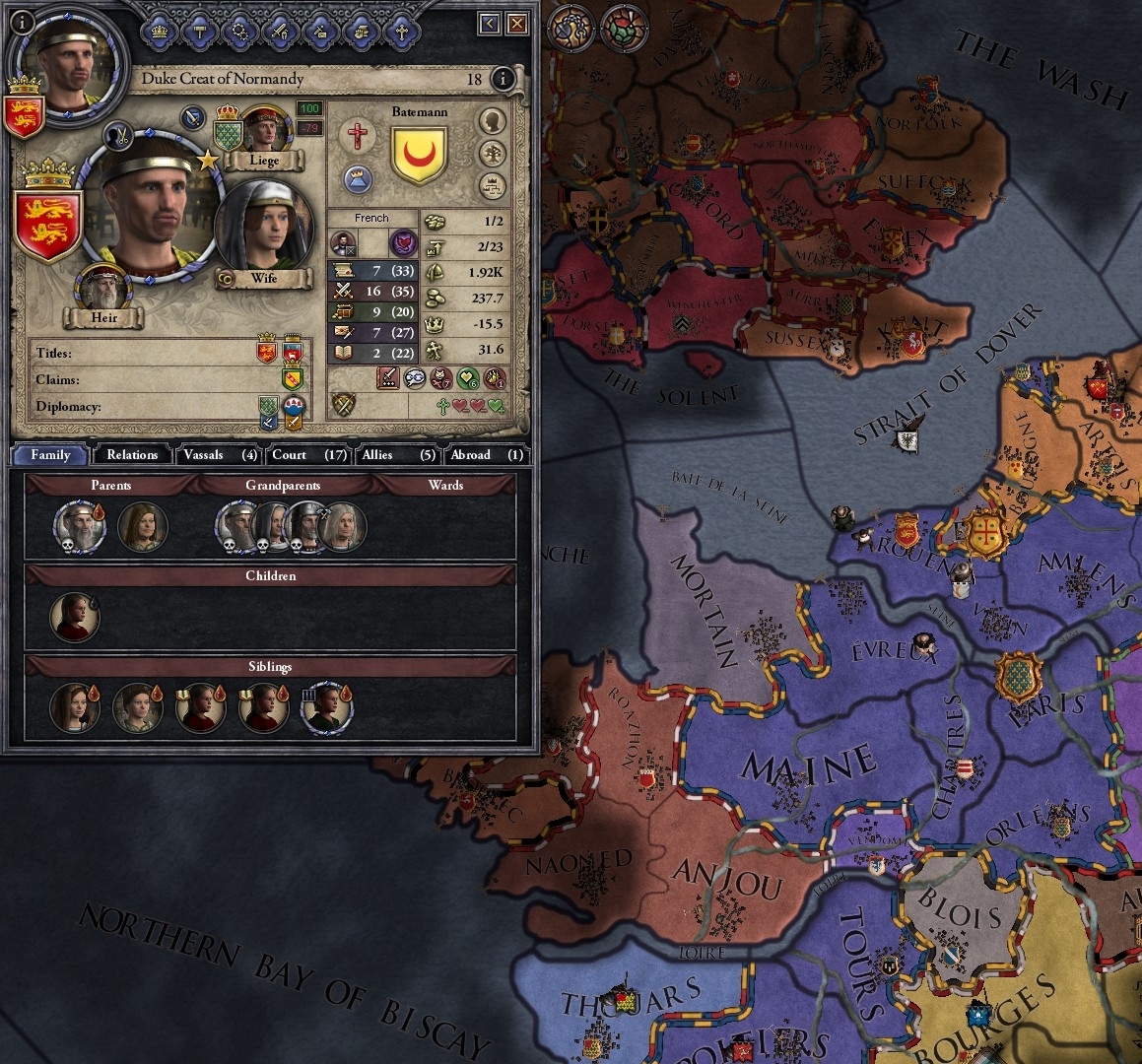  : I shall tell you of the Batemanns. For years, the Batemanns have been a thorn in our side. When I was born, the chief Batemann that pledged loyalty to us was Duke Creat de Normandy. A young man at the time, coming fresh from a war against his king. : I shall tell you of the Batemanns. For years, the Batemanns have been a thorn in our side. When I was born, the chief Batemann that pledged loyalty to us was Duke Creat de Normandy. A young man at the time, coming fresh from a war against his king.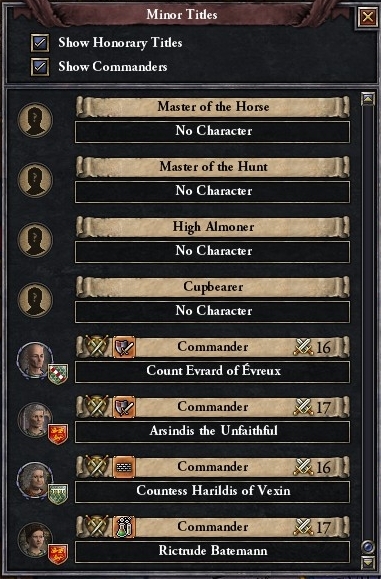  : Like all nobles in Karling realms, Creat was a Cathar. He did not hold back women from leading his troops, like so many others in Europe did. : Like all nobles in Karling realms, Creat was a Cathar. He did not hold back women from leading his troops, like so many others in Europe did.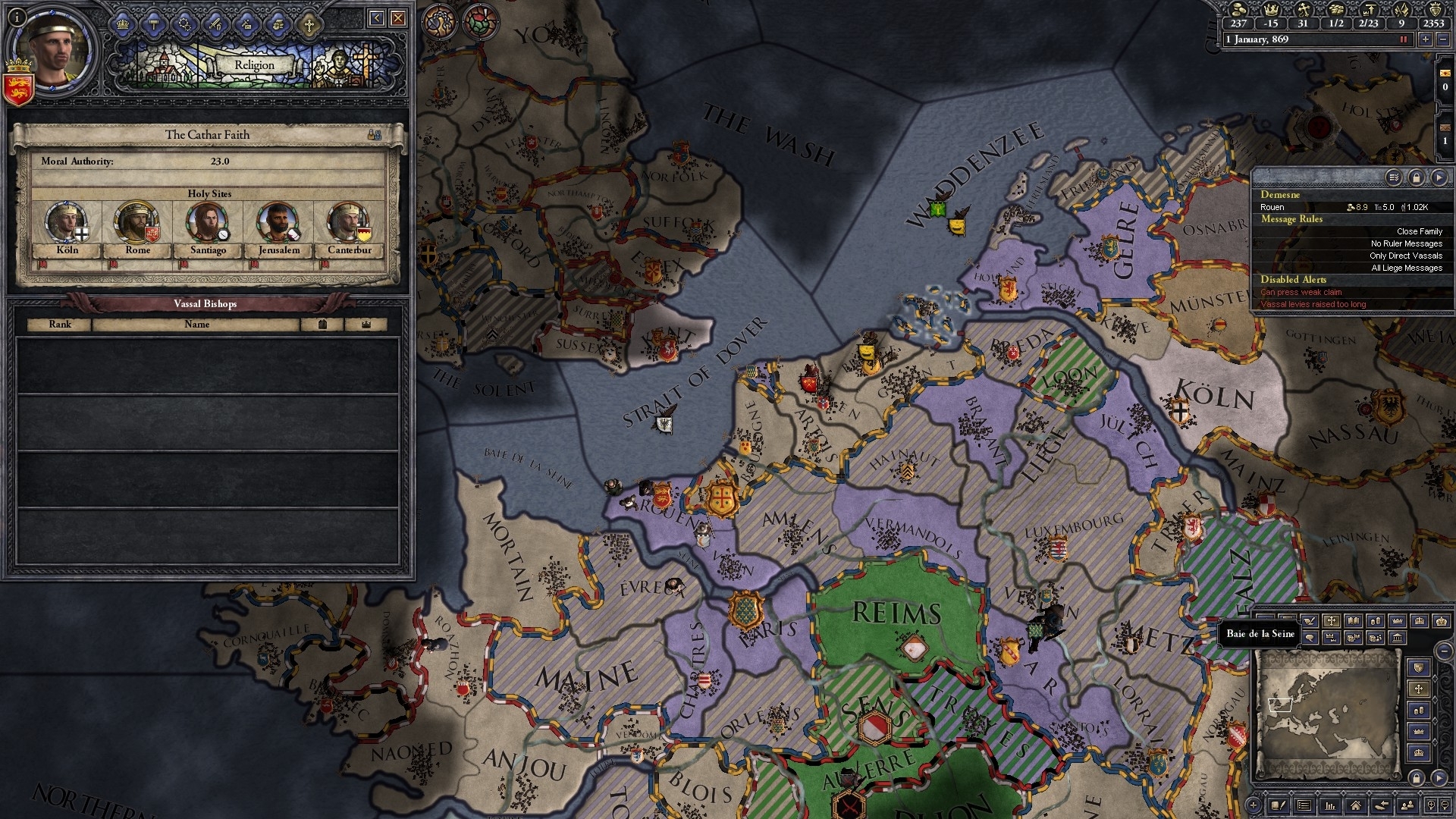  : And we were strong, and we spread through Francia, ever since Karl the Great took the Consolamentum. : And we were strong, and we spread through Francia, ever since Karl the Great took the Consolamentum.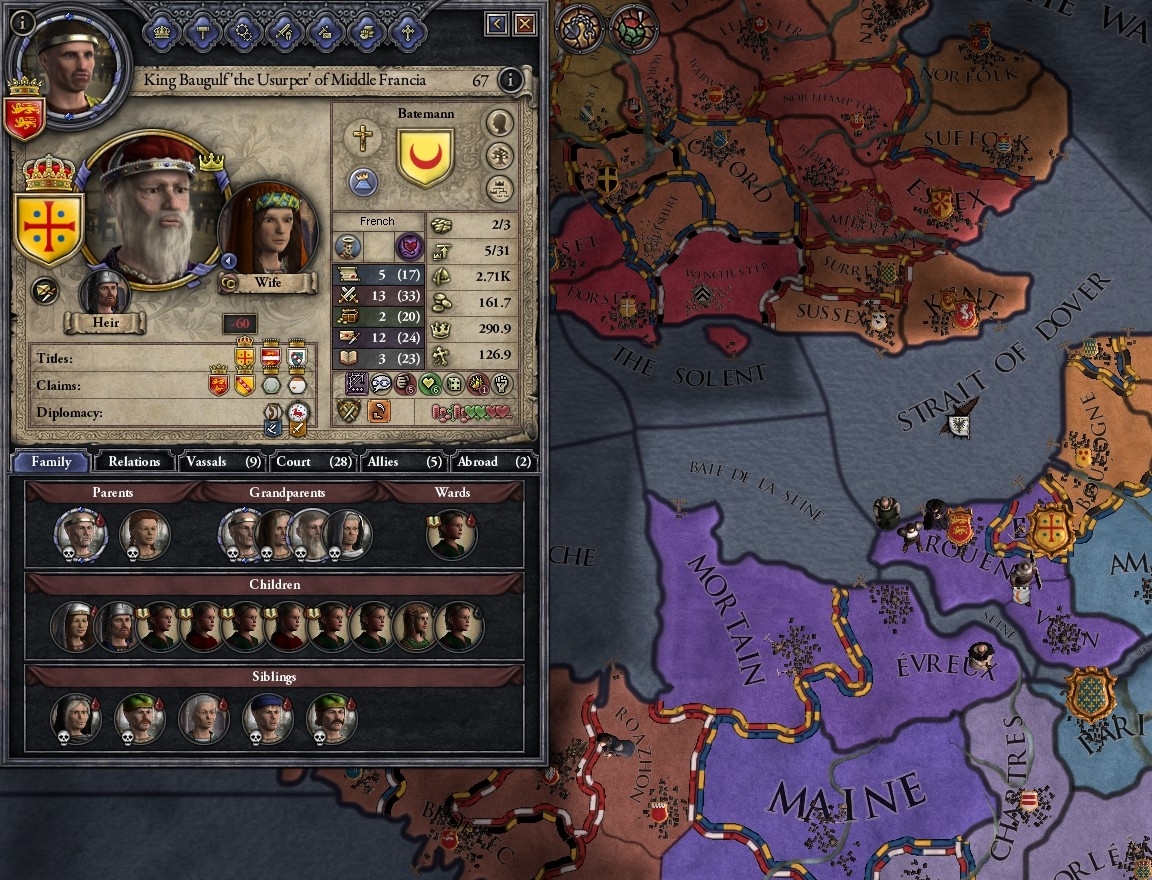  : Not all of Normandy belonged to Creat, however. His distant relative, King Baugulf, of the bastard kingdom of Middle Francia, still held on to two counties on the coast. : Not all of Normandy belonged to Creat, however. His distant relative, King Baugulf, of the bastard kingdom of Middle Francia, still held on to two counties on the coast. 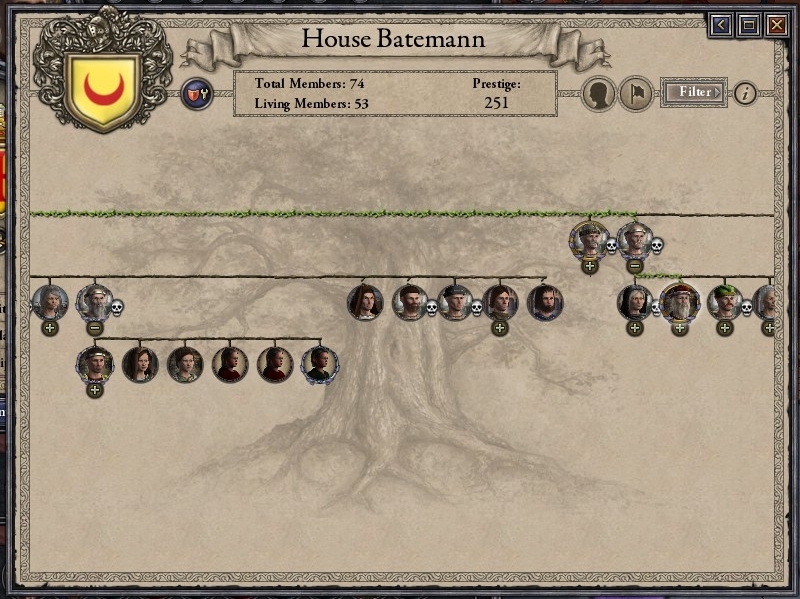  : As with all the blue bloods in our part of the world, Creat was kin to Baugulf: his grandfather was Baugulf's uncle. : As with all the blue bloods in our part of the world, Creat was kin to Baugulf: his grandfather was Baugulf's uncle.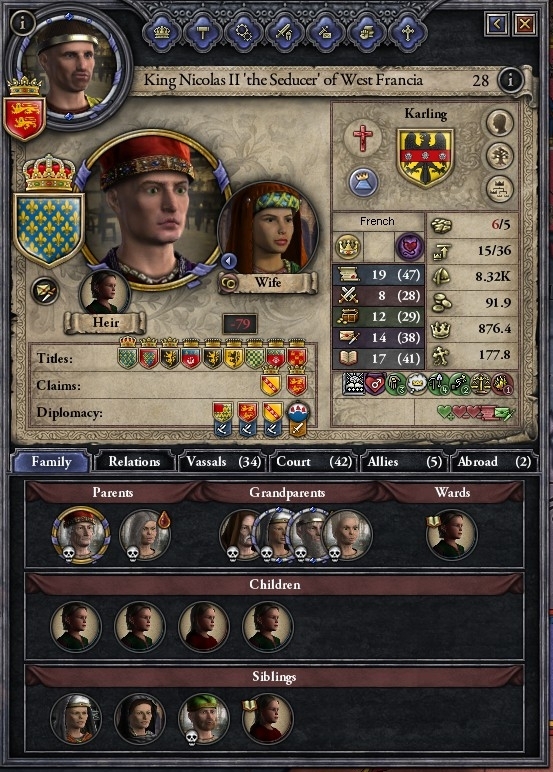  : My uncle Nicolas was a good, strong king, and a cousin to Creat on his mother's side. : My uncle Nicolas was a good, strong king, and a cousin to Creat on his mother's side.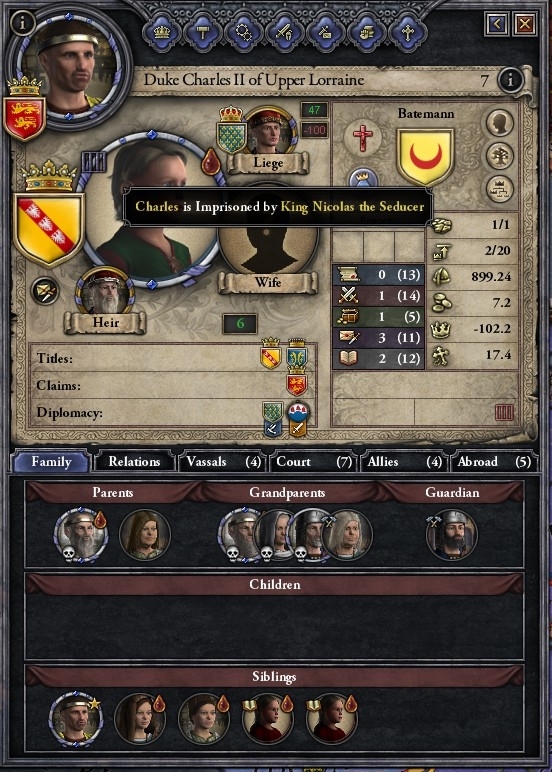  : Creat's brother, a mere child, rife with bad ideas, was his close friend. Their realms were far apart, and yet they were as close as brothers could be. : Creat's brother, a mere child, rife with bad ideas, was his close friend. Their realms were far apart, and yet they were as close as brothers could be.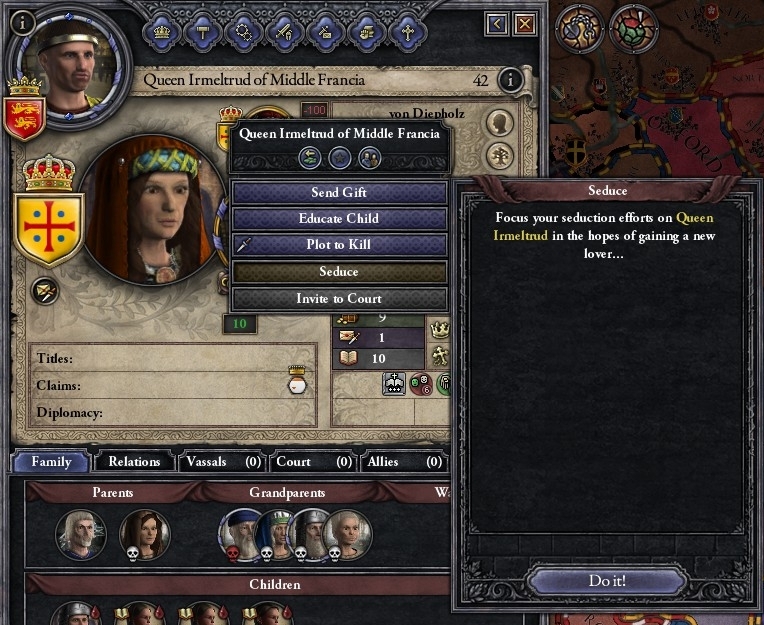  : Creat knew he was small, and his lands were small. And he plotted, and he schemed, and he seduced. : Creat knew he was small, and his lands were small. And he plotted, and he schemed, and he seduced.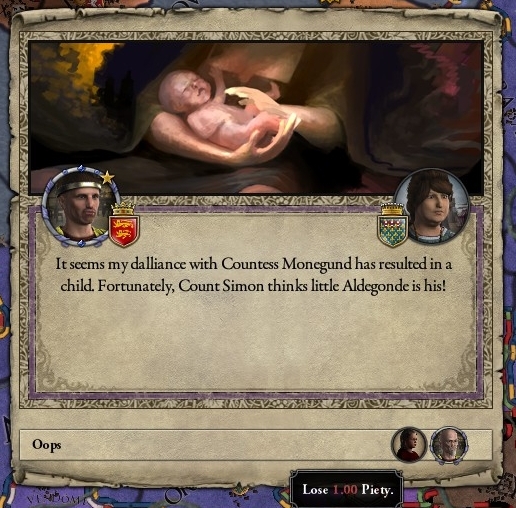  : Sometimes I wonder if it was nothing but sport for him. He sired dozens of bastards, after all. : Sometimes I wonder if it was nothing but sport for him. He sired dozens of bastards, after all.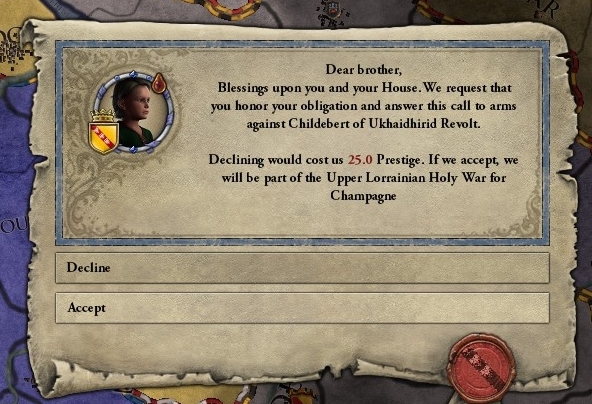  : His brother, a boy of seven, on the advice of his court, decided to wage war on Rafid rebels. Something about conquering ancestral Frankish lands from the heathens or some such nonsense. : His brother, a boy of seven, on the advice of his court, decided to wage war on Rafid rebels. Something about conquering ancestral Frankish lands from the heathens or some such nonsense.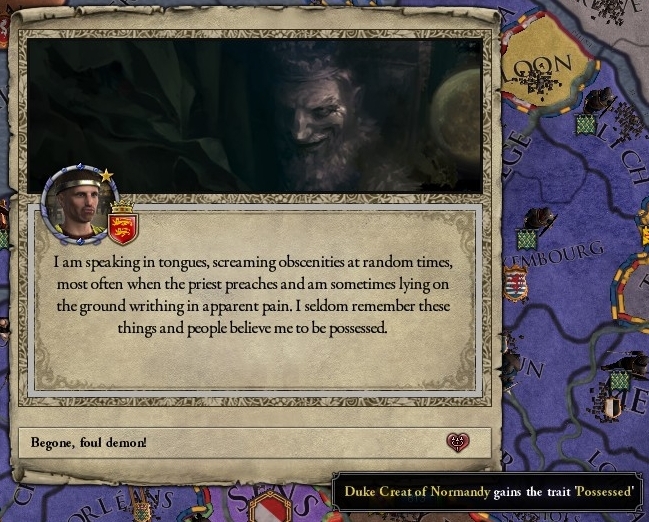  : I've heard rumours around my uncle's court that this is when the Holy Spirit entered Creat, and he spoke in God's tongues of Jesus. Nonsense, I say. I've met the man. He was sometimes sick, nothing more. : I've heard rumours around my uncle's court that this is when the Holy Spirit entered Creat, and he spoke in God's tongues of Jesus. Nonsense, I say. I've met the man. He was sometimes sick, nothing more.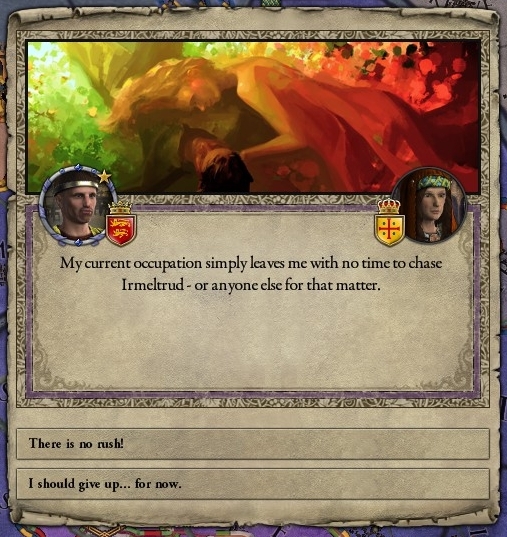  : But the war did call him away from the Middle Francian court, and his uncle's wife. : But the war did call him away from the Middle Francian court, and his uncle's wife.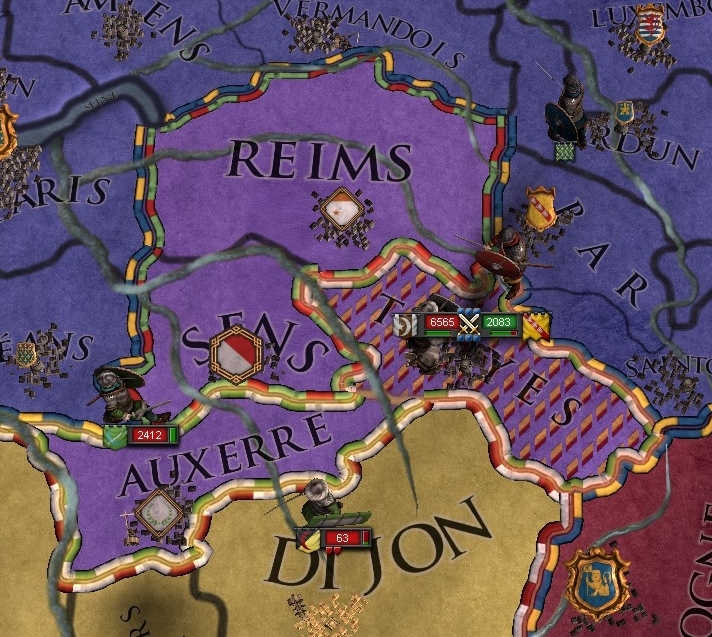  : I wonder if he thought it worth it, when the Rafid Sultanate got over their squabbles and fell on his armies in force. : I wonder if he thought it worth it, when the Rafid Sultanate got over their squabbles and fell on his armies in force.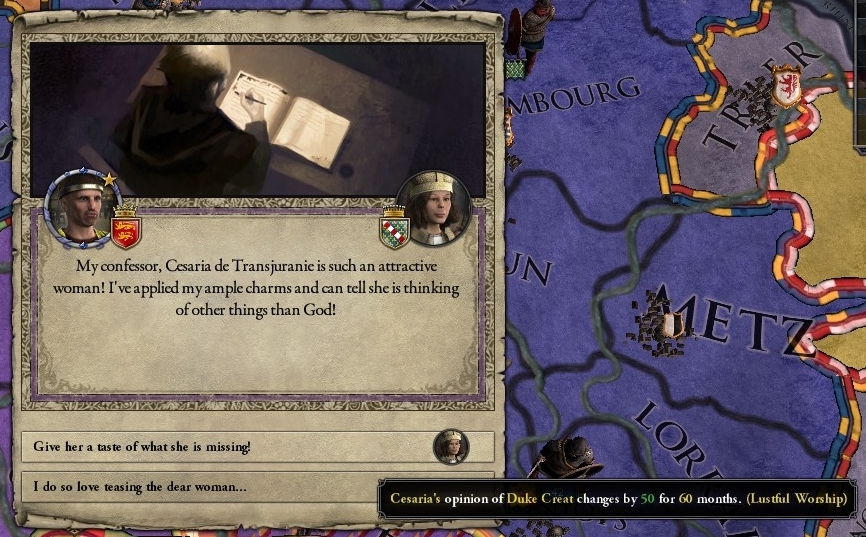  : He never stopped practicing his seduction, of course. Titles did not stop him, and neither did the church. : He never stopped practicing his seduction, of course. Titles did not stop him, and neither did the church.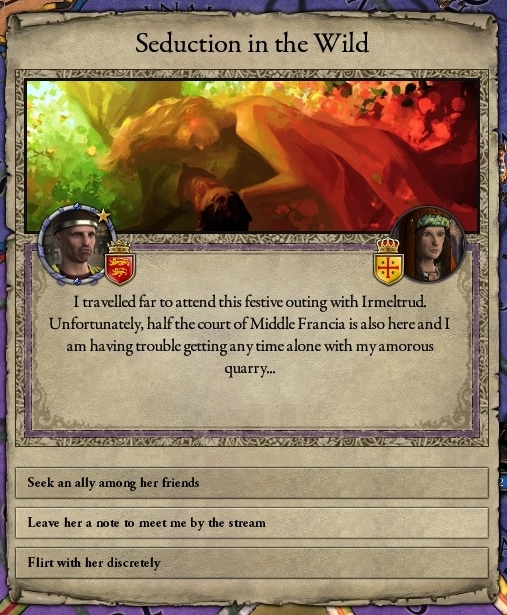  : With his armies shattered, he wished his brother farewell, and set off to Eu, to woo the queen. : With his armies shattered, he wished his brother farewell, and set off to Eu, to woo the queen.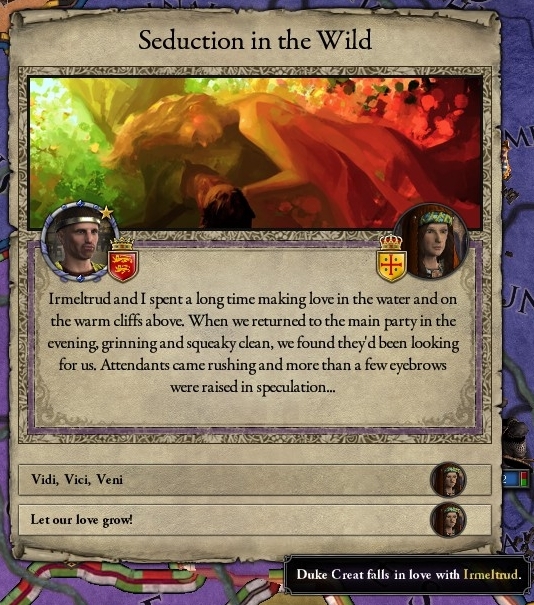  : To his credit, he was an exceptional lover. : To his credit, he was an exceptional lover.Madame de Beaumont looks around to find the rest of the Caravan assembled around her on the deck, listening to her tale. For a moment, she blushes. But her composure returns in seconds, and she continues the story. 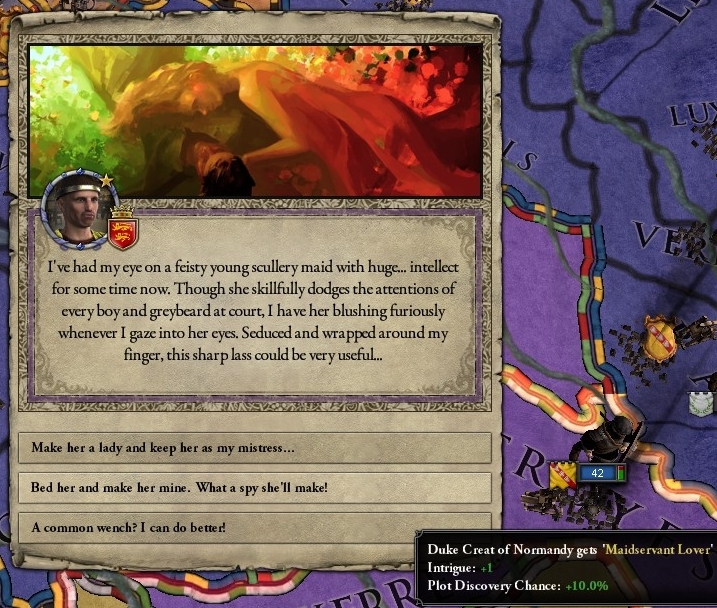  : Indiscriminate, too. I heard rumours that he even screwed the help! Some people. : Indiscriminate, too. I heard rumours that he even screwed the help! Some people.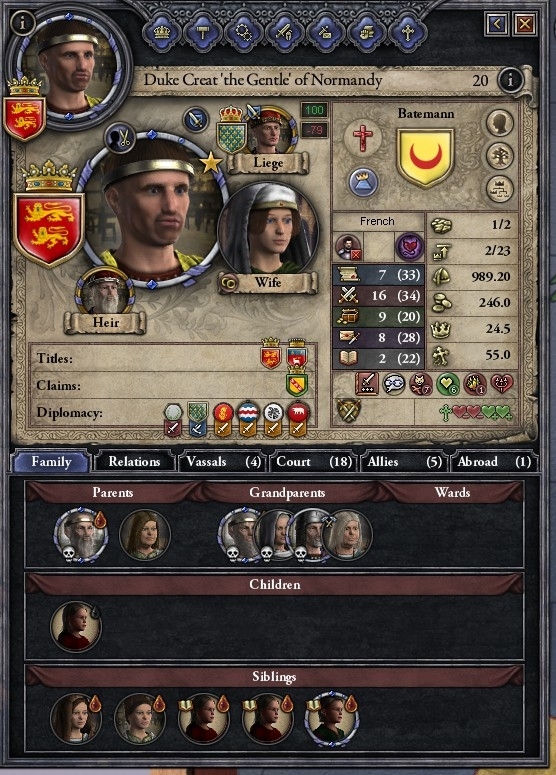  : His escapades did not go unnoticed, and around the kingdom, women spoke of Duke Creat the Gentle, as soon as their husbands were out of earshot. : His escapades did not go unnoticed, and around the kingdom, women spoke of Duke Creat the Gentle, as soon as their husbands were out of earshot.She looks around her, the sandy shores drifting further away in the distance. 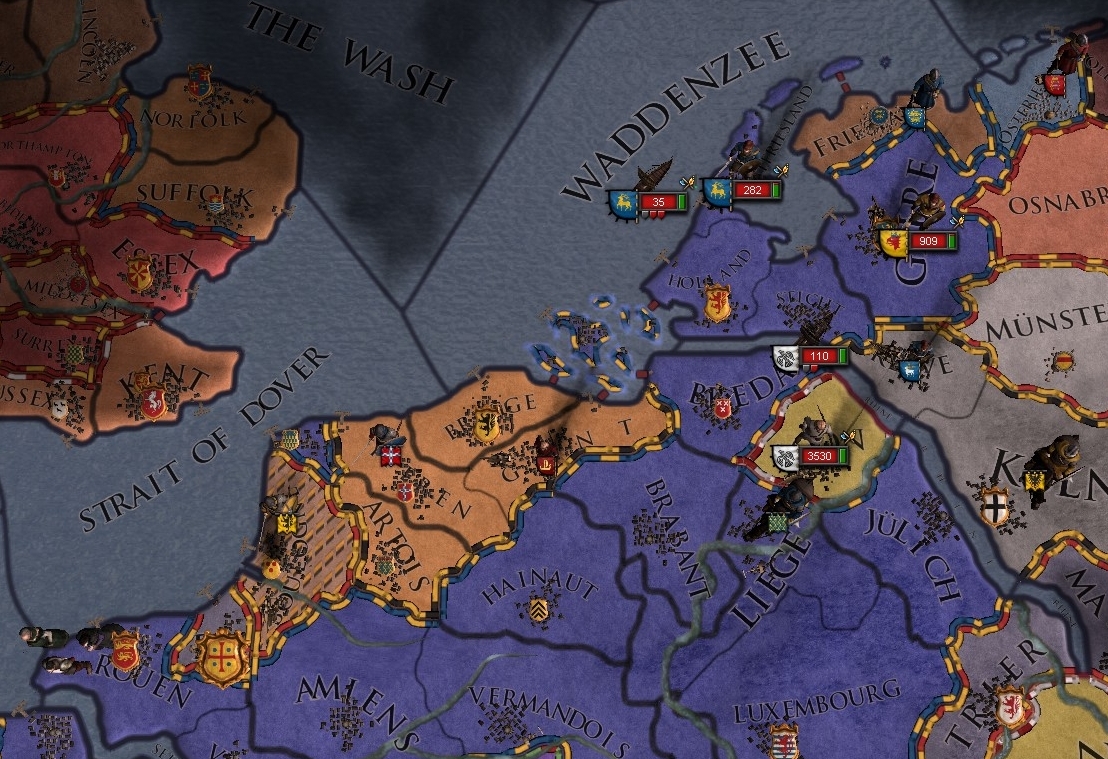  : I must confess, I am wary of the sea. The sea brings the northern healthens. Thousands of Vikings roamed the Karling lands, seizing what they could: treasure, women, holy relics. : I must confess, I am wary of the sea. The sea brings the northern healthens. Thousands of Vikings roamed the Karling lands, seizing what they could: treasure, women, holy relics.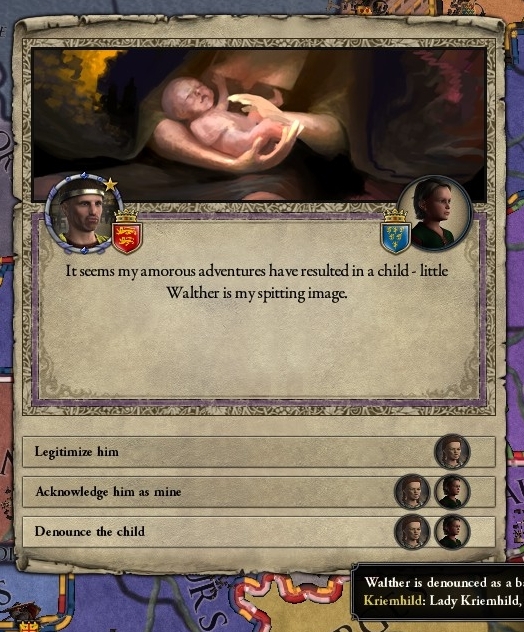  : But for now, Creat's problems did not come from across the sea. Women across the land gave birth to his bastards - : But for now, Creat's problems did not come from across the sea. Women across the land gave birth to his bastards - 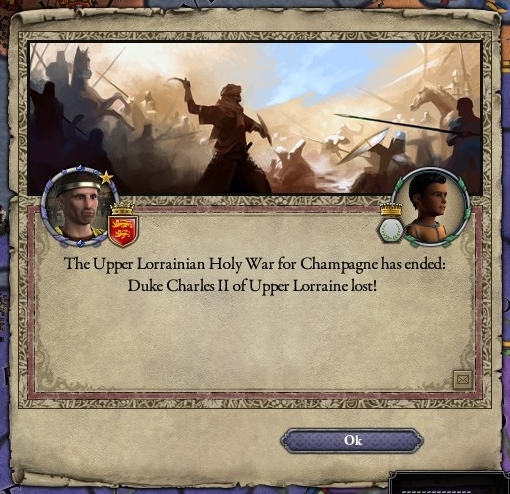  : And his brother has finally surrendered to the Muslims. : And his brother has finally surrendered to the Muslims.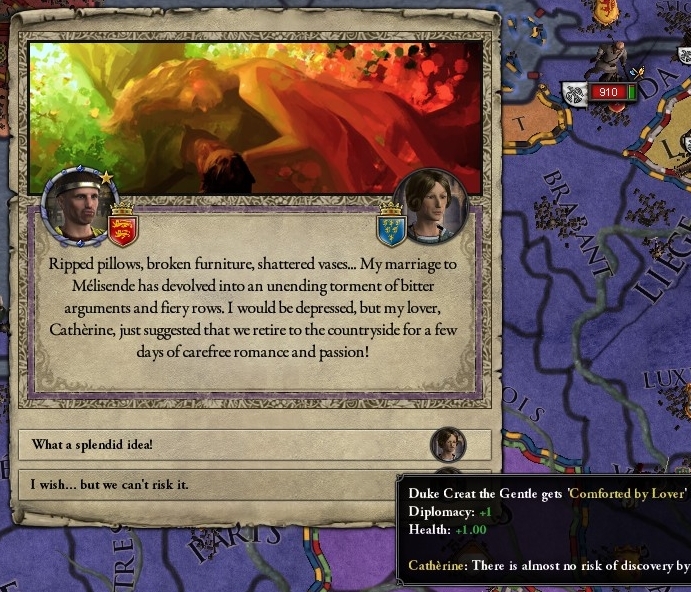  : Creat's first wife, Melisende, was not a happy woman. An endless parade of bastards and their mothers wandered into Rouen. She made sure the Duke knew how unhappy she was. : Creat's first wife, Melisende, was not a happy woman. An endless parade of bastards and their mothers wandered into Rouen. She made sure the Duke knew how unhappy she was.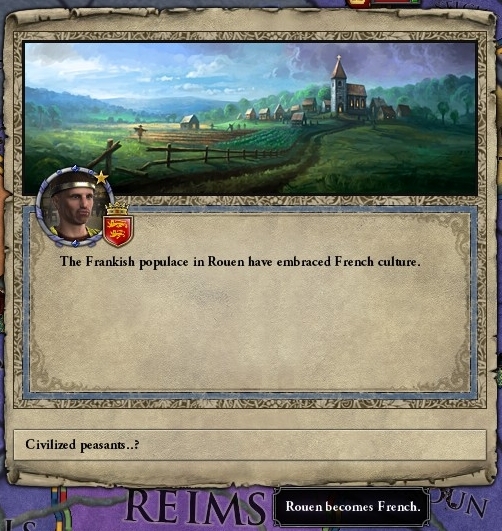  : But these mothers spoke French, and brought French courtiers with them. Eventually, all of Rouen spoke French, as a proper noble court should. : But these mothers spoke French, and brought French courtiers with them. Eventually, all of Rouen spoke French, as a proper noble court should.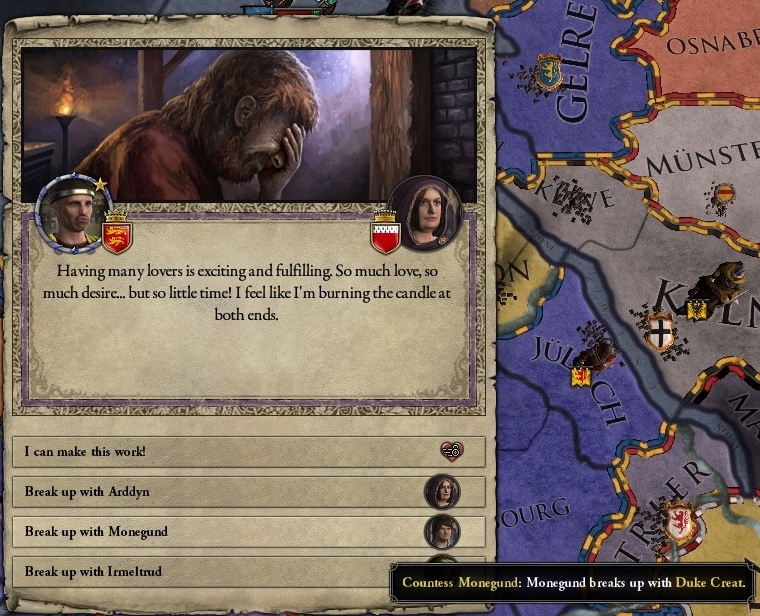  : In order to please his wife, and have a few breaths to himself, the Duke ended several affairs with noblewomen. : In order to please his wife, and have a few breaths to himself, the Duke ended several affairs with noblewomen.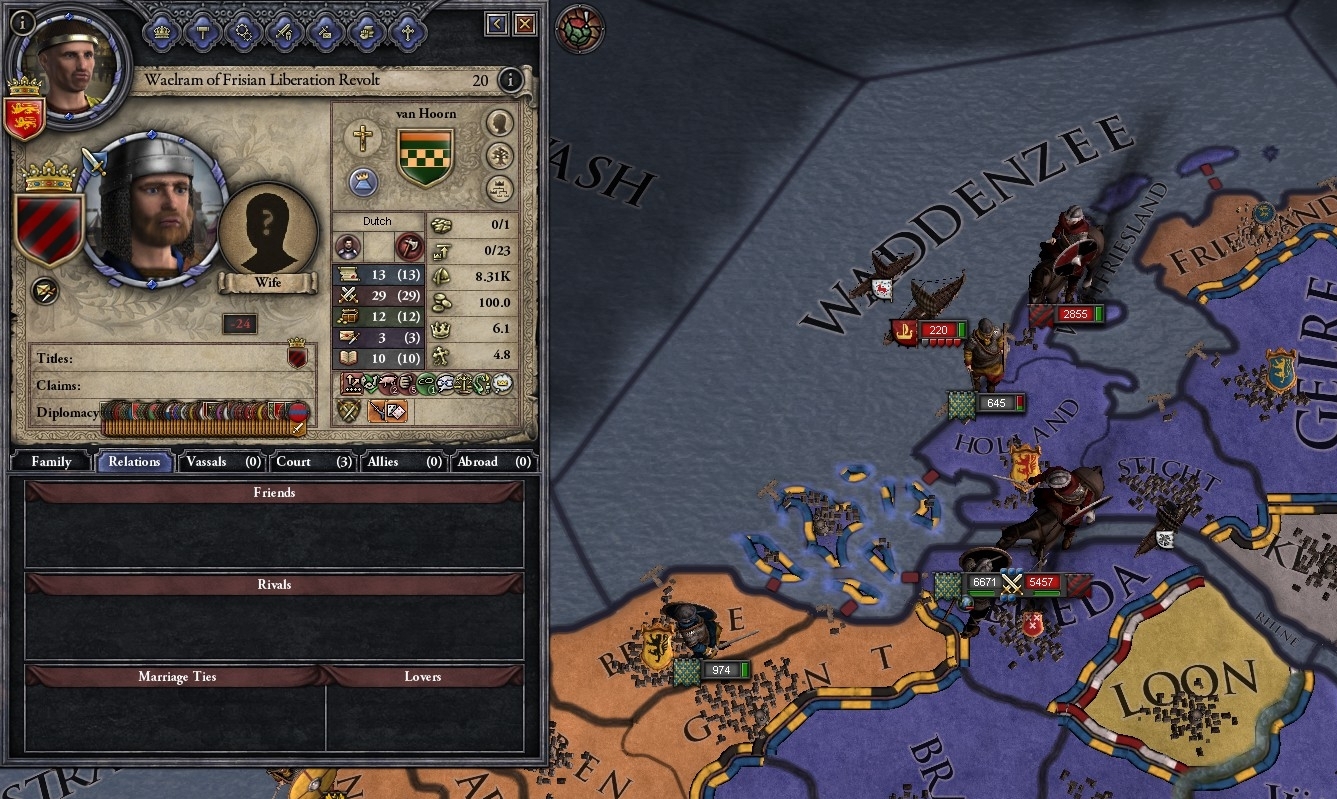  : This was around the time my uncle had to deal with the Frisians demanding independence. A Karling to the end, he fought them to the last man. : This was around the time my uncle had to deal with the Frisians demanding independence. A Karling to the end, he fought them to the last man.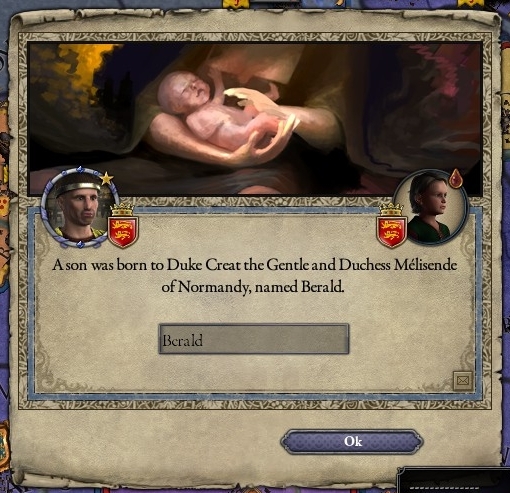  : It was a surprise to all of us at court when we saw a legitimate son of the Duke paraded in front of us. We weren't sure the Duke even saw the Duchess. : It was a surprise to all of us at court when we saw a legitimate son of the Duke paraded in front of us. We weren't sure the Duke even saw the Duchess.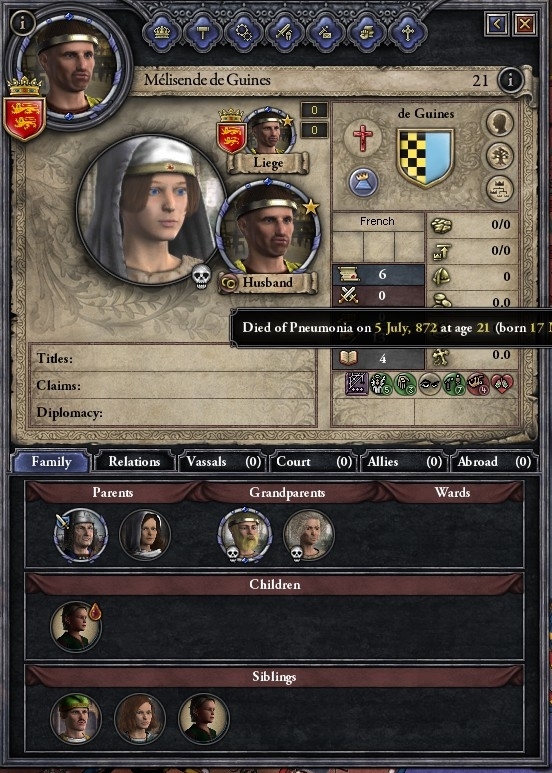  : Sadly, Melisende did not make it through her sickness, and passed away shortly after Berald was born. : Sadly, Melisende did not make it through her sickness, and passed away shortly after Berald was born.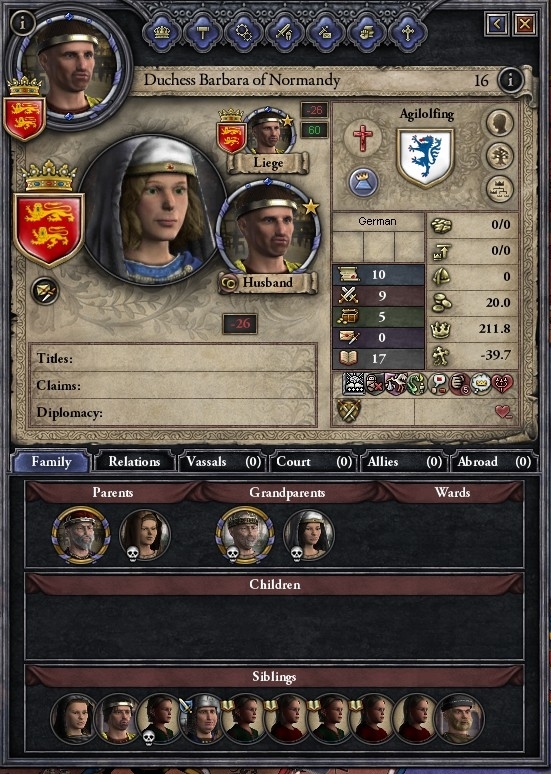  : Creat brought a new wife with him from Germany. She was... eccentric. : Creat brought a new wife with him from Germany. She was... eccentric.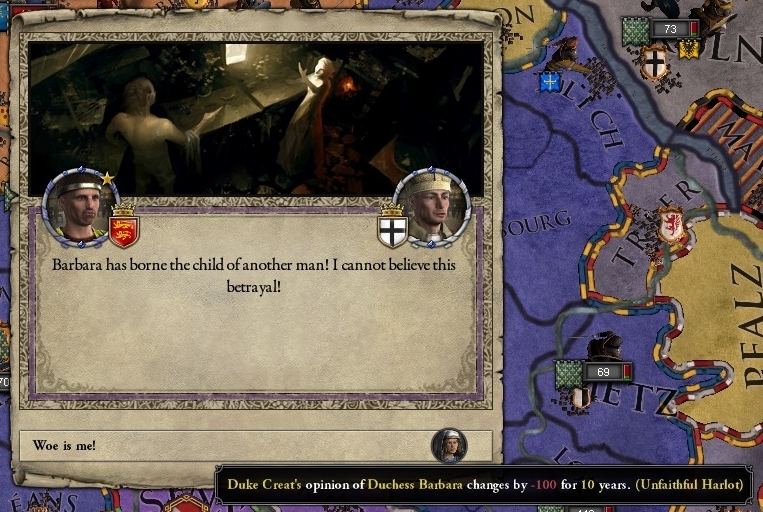  : And she shared Creat's habit of loving the church. : And she shared Creat's habit of loving the church.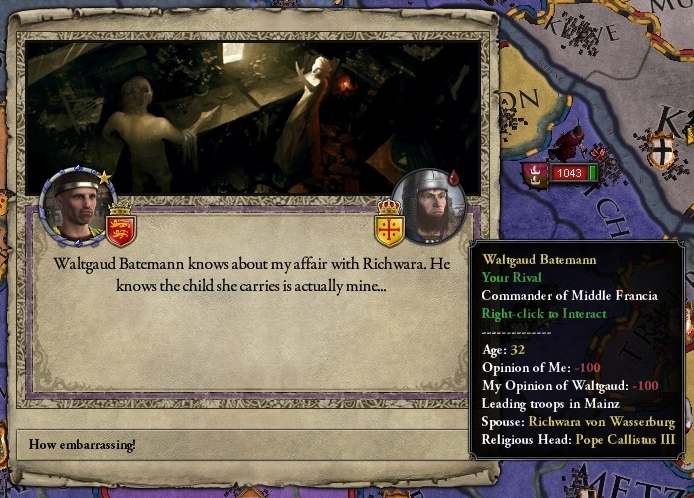  : Another one of the Duke's affairs came to a head. Another Middle Francian Batemann proclaimed in court that Creat has made a cuckold of him. : Another one of the Duke's affairs came to a head. Another Middle Francian Batemann proclaimed in court that Creat has made a cuckold of him.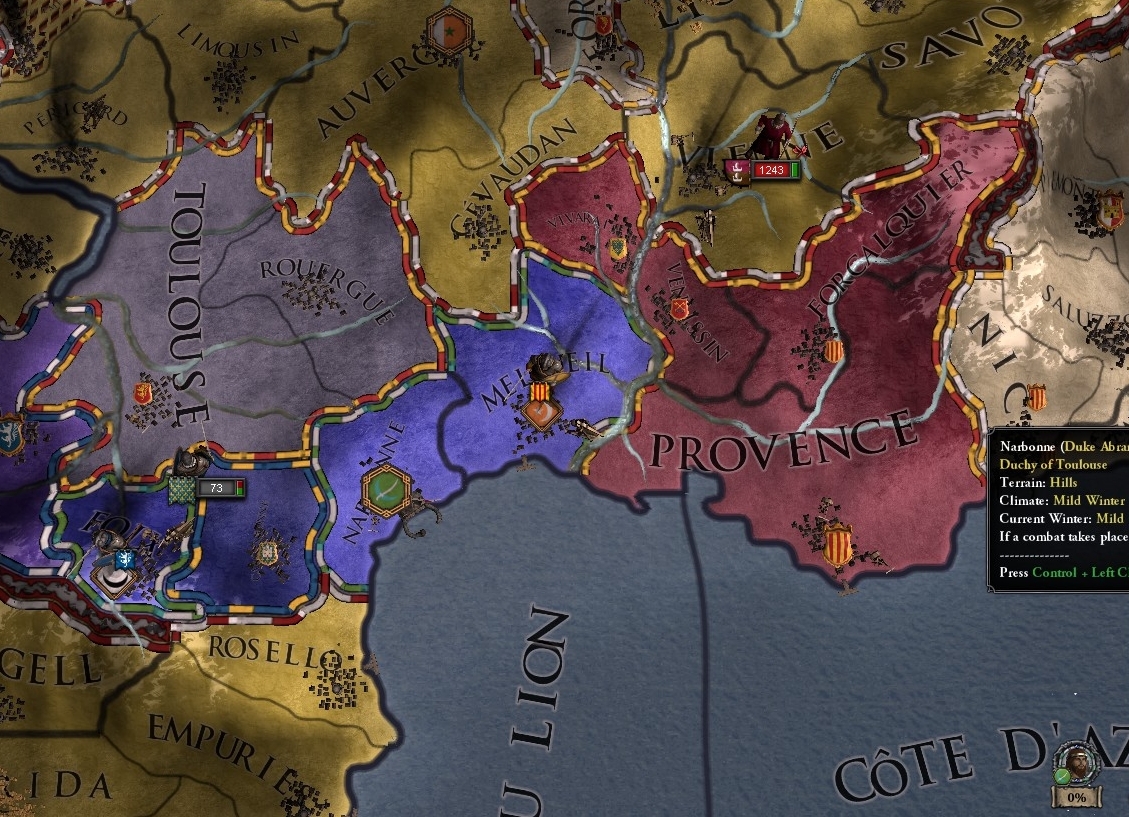  : In the south, Provence was at war with the nearby Muslim duchies, and my uncle took his troops to help the Bons Hommes. : In the south, Provence was at war with the nearby Muslim duchies, and my uncle took his troops to help the Bons Hommes.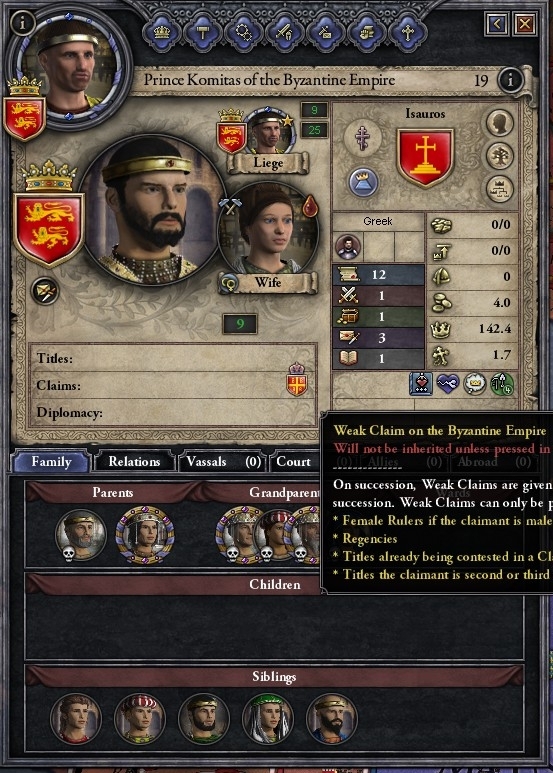  : Creat named his sister marshall, and married her to a Prince of the Roman Empire. When the man arrived, however, it was clear that his parents shared parents. : Creat named his sister marshall, and married her to a Prince of the Roman Empire. When the man arrived, however, it was clear that his parents shared parents.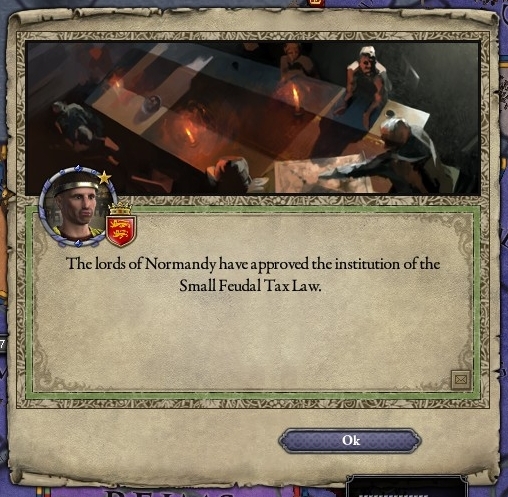  : The Duke's lover, the Queen of Middle Francia, told him in secret that her husband planned war against my uncle on the eastern frontiers. Planning his strike, Creat called on his vassals for more money. : The Duke's lover, the Queen of Middle Francia, told him in secret that her husband planned war against my uncle on the eastern frontiers. Planning his strike, Creat called on his vassals for more money.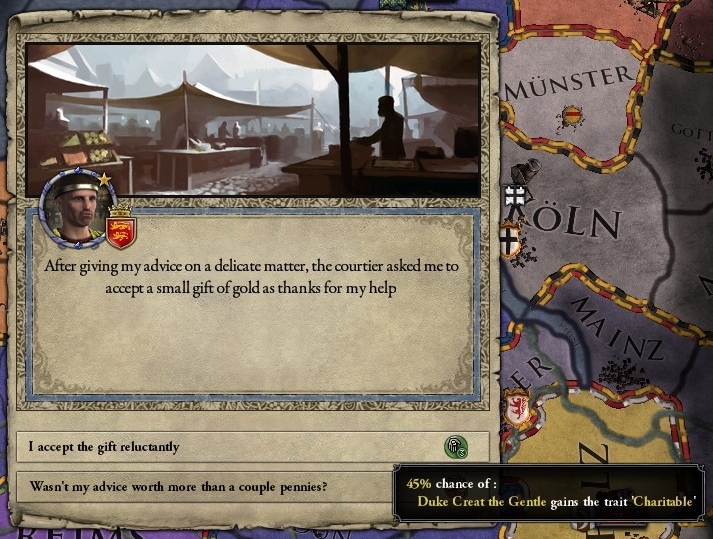  : The Duke was lived up to his name. A kind man, and charitable. He gave easily, and the people loved him for it. : The Duke was lived up to his name. A kind man, and charitable. He gave easily, and the people loved him for it.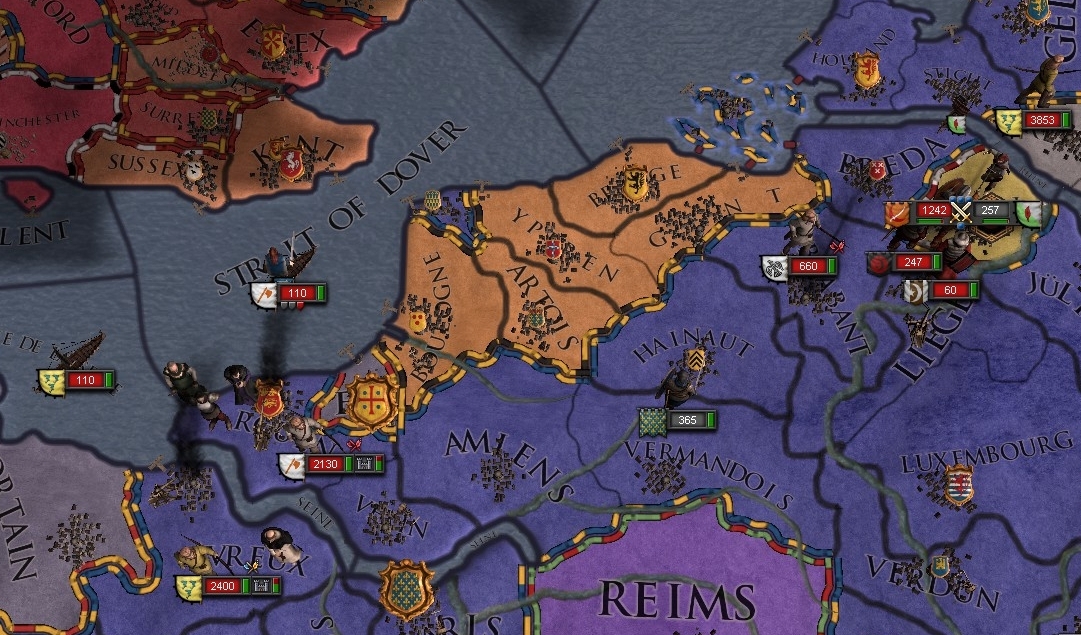  : But a reputation for being soft bring vultures. The Vikings swept across Normandy, pillaging as they went. : But a reputation for being soft bring vultures. The Vikings swept across Normandy, pillaging as they went.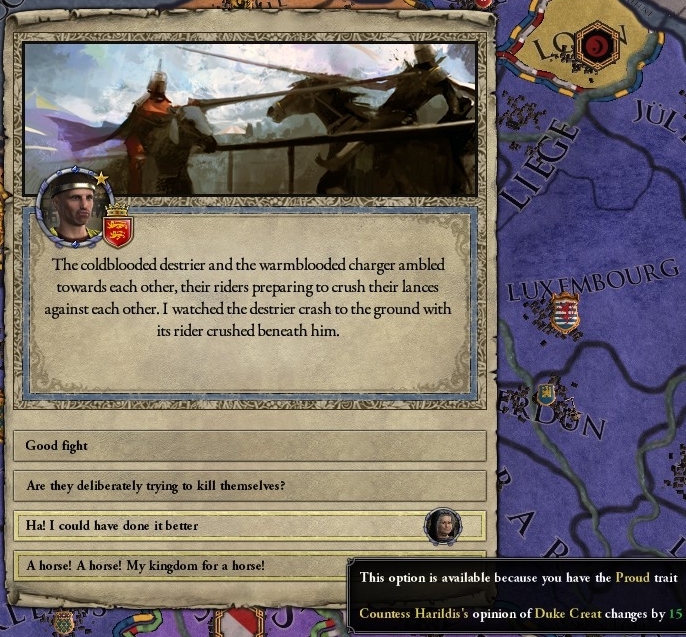  : To hide from the viking invasion, Creat went to Paris, to watch a tournament organized by my uncle. I hear he was a boisterous guest, and a favourite of the women present. : To hide from the viking invasion, Creat went to Paris, to watch a tournament organized by my uncle. I hear he was a boisterous guest, and a favourite of the women present.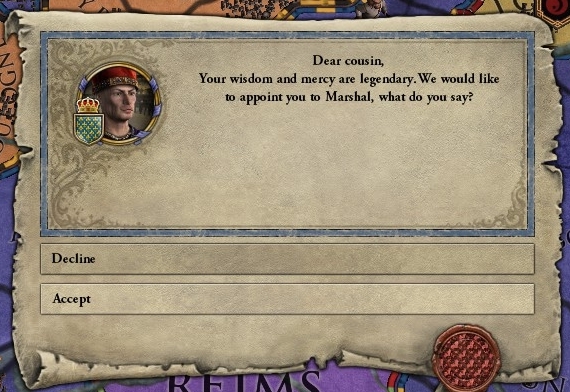  : During the tournament, my uncle approached him, and praised his leadership in his brother's war. He offered him a stipend and prestige, if he stayed in Paris and trained my uncle's troops. He said yes, of course. After all, how can you say no to family? : During the tournament, my uncle approached him, and praised his leadership in his brother's war. He offered him a stipend and prestige, if he stayed in Paris and trained my uncle's troops. He said yes, of course. After all, how can you say no to family?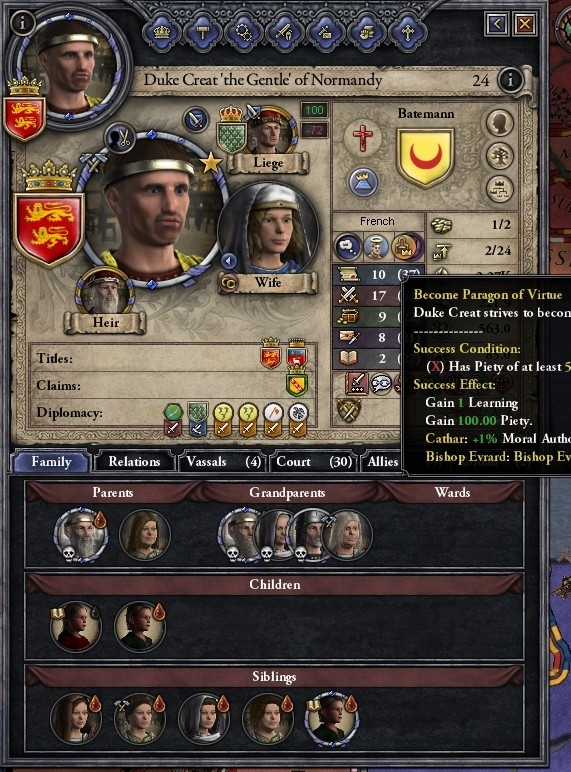  : It was all that Creat wanted from his liege. But with his goal achieved, what more could he want. And he wished to be more like the Bons Hommes. : It was all that Creat wanted from his liege. But with his goal achieved, what more could he want. And he wished to be more like the Bons Hommes.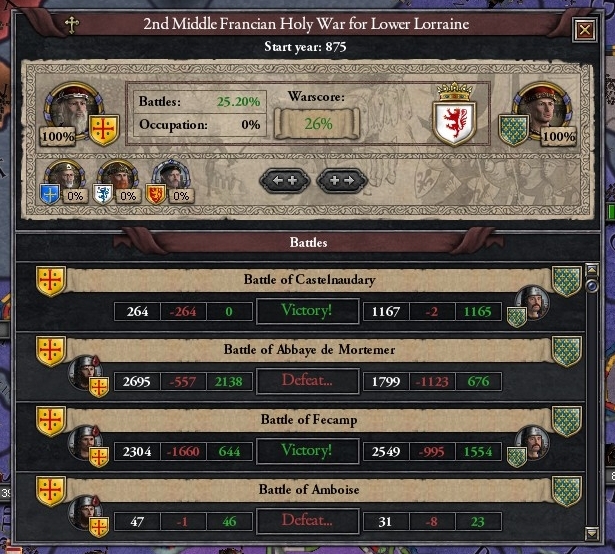  : Soon after Creat has started his tenure as marshall, Baugulf marched on my uncle's lands. With the war in the east going poorly for him, the Duke left men to continue his training, and rode back home. : Soon after Creat has started his tenure as marshall, Baugulf marched on my uncle's lands. With the war in the east going poorly for him, the Duke left men to continue his training, and rode back home.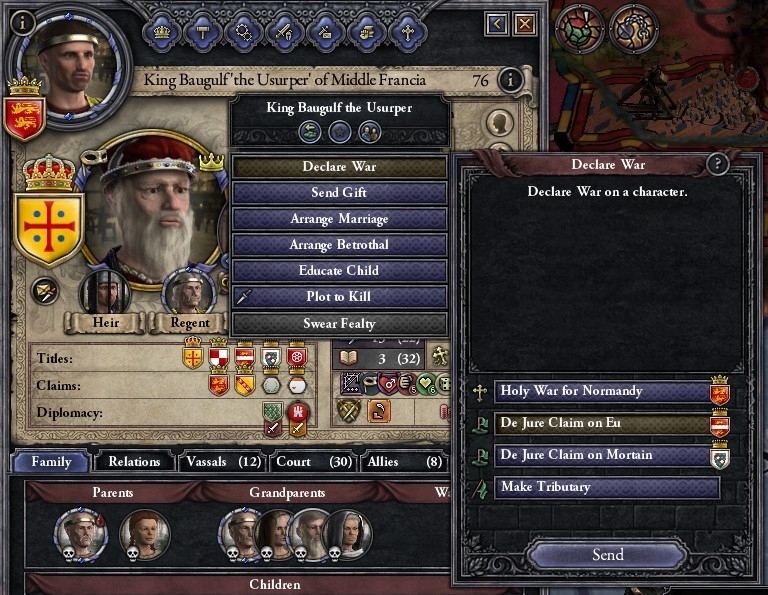  : He raised his banners, and marched on Eu, claiming it as a rightful part of his domain. : He raised his banners, and marched on Eu, claiming it as a rightful part of his domain.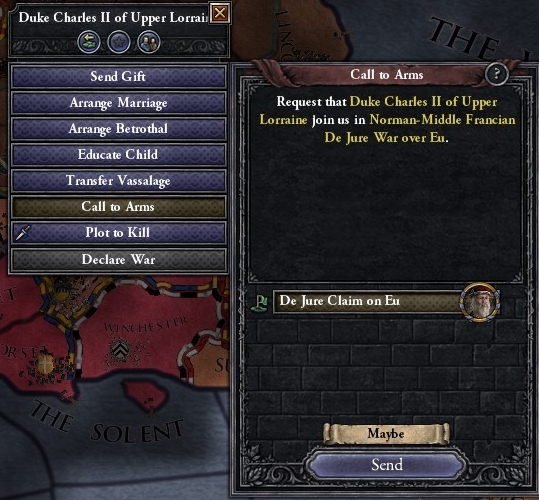  : Of course, he asked his brother for help. And of course, his brother answered his call. : Of course, he asked his brother for help. And of course, his brother answered his call.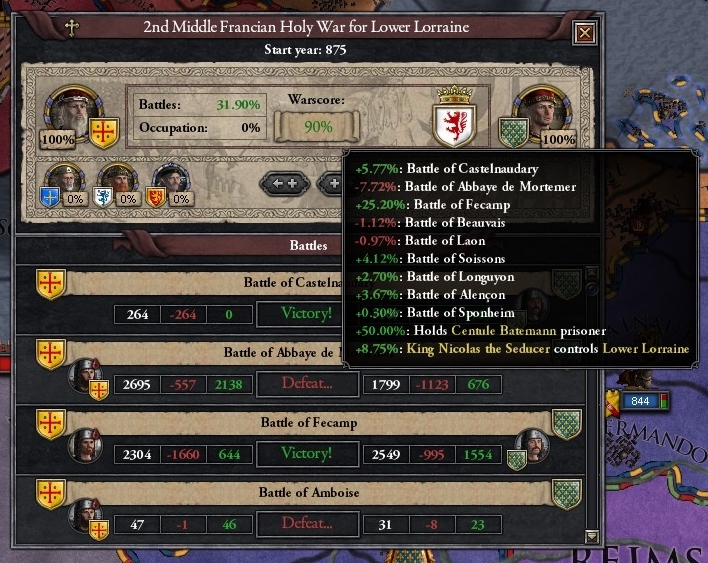  : After a series of disasterous battles, my brother managed to capture Baugulf's heir, and held him prisoner. The old king's heart could not take such a loss, and he died. : After a series of disasterous battles, my brother managed to capture Baugulf's heir, and held him prisoner. The old king's heart could not take such a loss, and he died.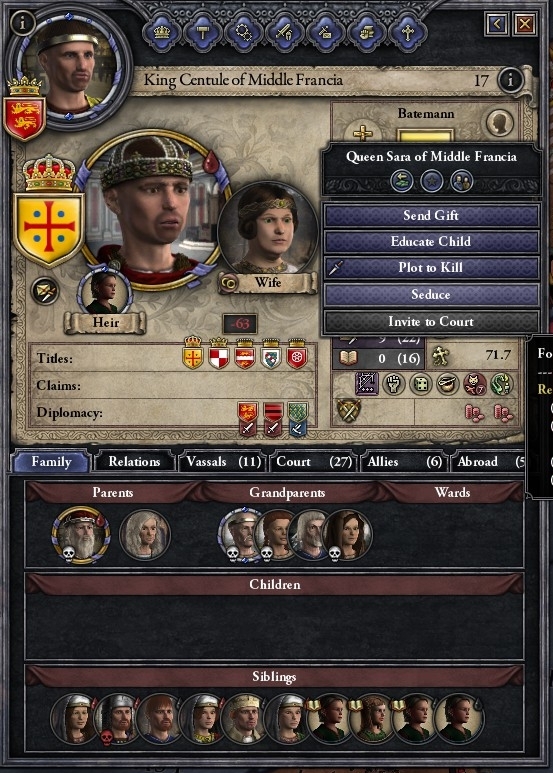  : Figuring just one queen was not enough of a spy, Creat immediately sent flattering letters to his cousin's wife. : Figuring just one queen was not enough of a spy, Creat immediately sent flattering letters to his cousin's wife.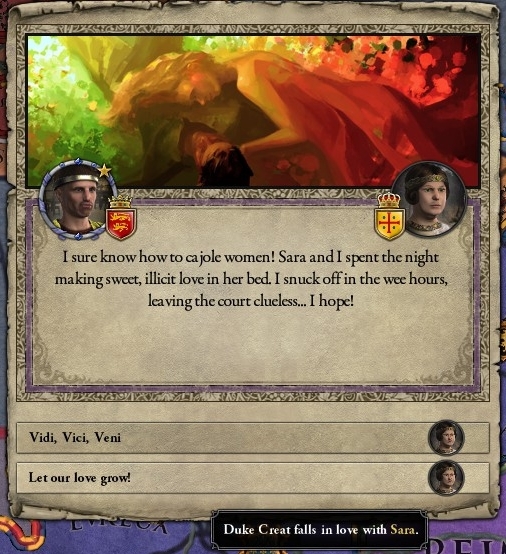  : He left his army under the cover of night, and snuck into the queen's chambers. Some say the moans could be heard all the through the countryside. : He left his army under the cover of night, and snuck into the queen's chambers. Some say the moans could be heard all the through the countryside.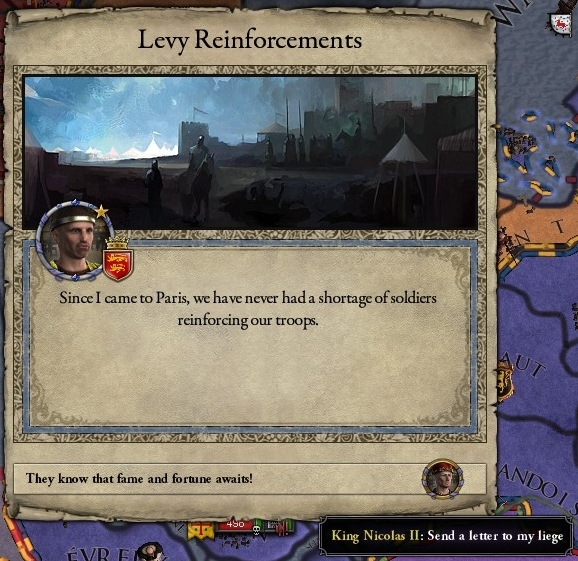  : Despite being far from Paris, the men he left to train in his stead were doing marvellous work. My brother had quite an army fighting for him. : Despite being far from Paris, the men he left to train in his stead were doing marvellous work. My brother had quite an army fighting for him.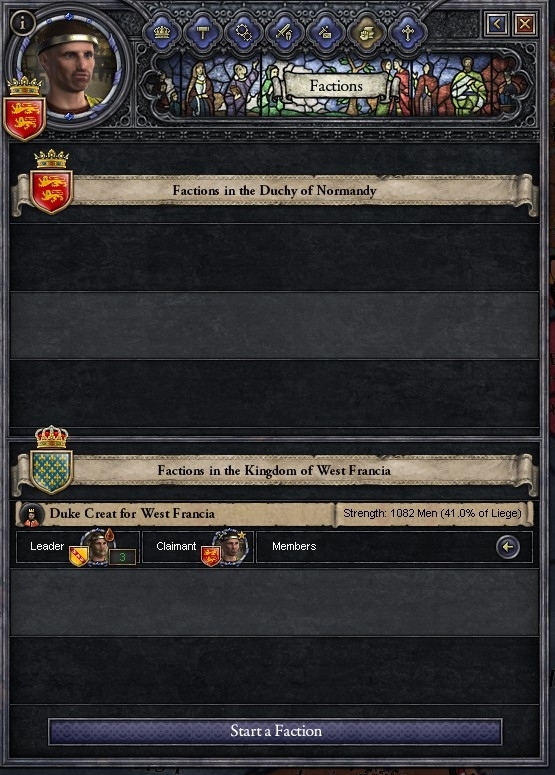  : As the siege of Eu continued, Charles came of age. He spoke well of his brother at court in Paris. Perhaps, too well. : As the siege of Eu continued, Charles came of age. He spoke well of his brother at court in Paris. Perhaps, too well.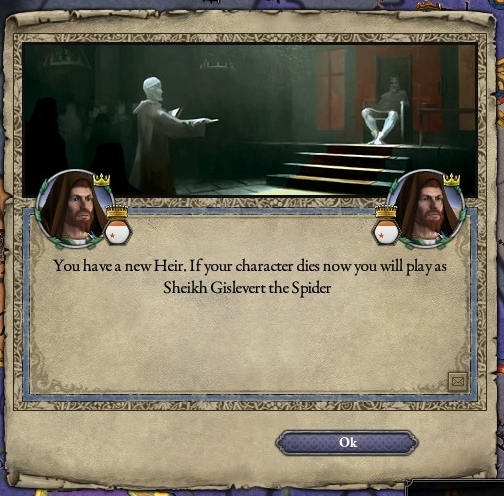  : The Normans had a peculiar way to determine succession. The oldest living man of the dynasty would inherit should a duke die. Before the war, Baugulf stood next in line for the Norman throne, but now a scheming Muslim from a distant branch of the family was Creat's heir. : The Normans had a peculiar way to determine succession. The oldest living man of the dynasty would inherit should a duke die. Before the war, Baugulf stood next in line for the Norman throne, but now a scheming Muslim from a distant branch of the family was Creat's heir.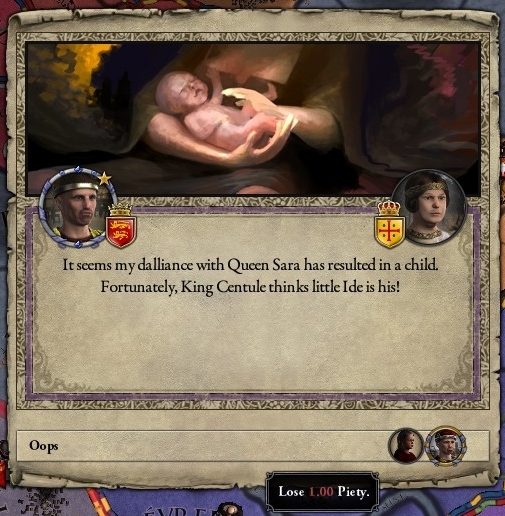  : The night the Duke sneaked into Eu did not pass without trace. Queen Sara was with child, another in the long line of Batemann bastards. : The night the Duke sneaked into Eu did not pass without trace. Queen Sara was with child, another in the long line of Batemann bastards.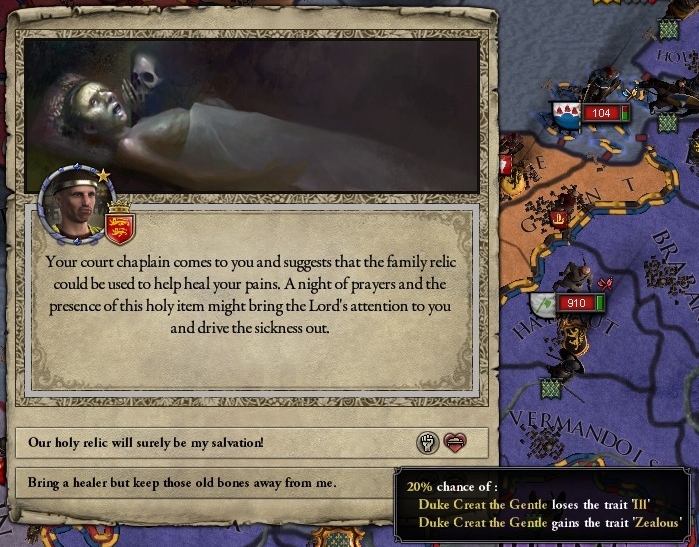  : After he heard the news, the Duke fell ill. One of his church girls came to him, and told him to pray to the old family holy relic. Unable to say no to women, he prayed all night. : After he heard the news, the Duke fell ill. One of his church girls came to him, and told him to pray to the old family holy relic. Unable to say no to women, he prayed all night.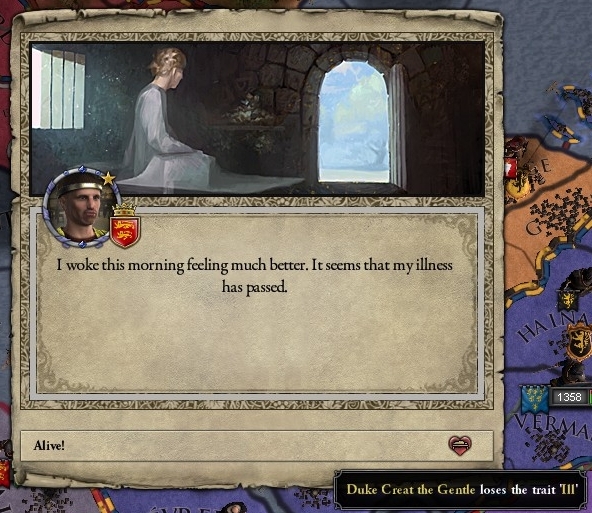  : And the next morning, his fever broke. The church girl was excited, and praised Jesus. I'm sure he praised her too. : And the next morning, his fever broke. The church girl was excited, and praised Jesus. I'm sure he praised her too.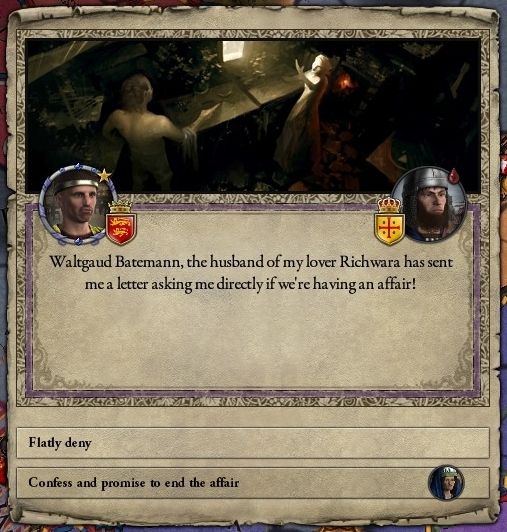  : As soon as the Duke was well enough to walk, his rival, the Middle Francian Batemann, demanded to know if he was loving his wife. : As soon as the Duke was well enough to walk, his rival, the Middle Francian Batemann, demanded to know if he was loving his wife.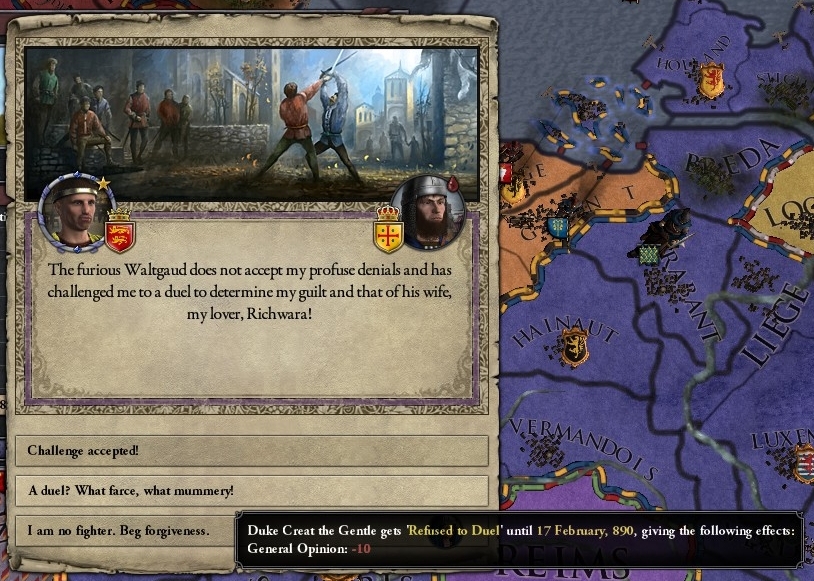  : The Duke was evasive, and, unsatisfied, Waltgauld demanded to duel him. Creat refused, not too certain of his fighting skills. : The Duke was evasive, and, unsatisfied, Waltgauld demanded to duel him. Creat refused, not too certain of his fighting skills.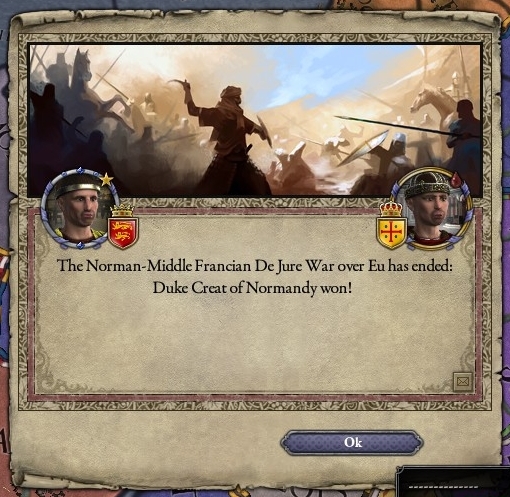  : He then rode out to Middle Francia, and demanded the King's surrender of Eu. The King had no choice but accept. : He then rode out to Middle Francia, and demanded the King's surrender of Eu. The King had no choice but accept.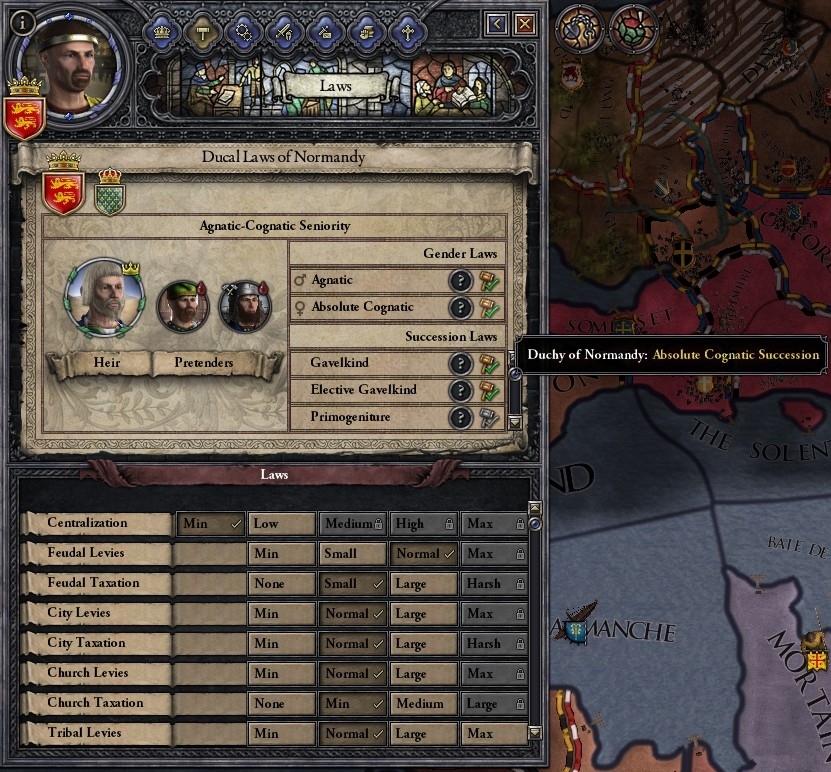  : With the war over, he assembled his vassals, and declared that just as women can become Bons Hommes, so can they rule over their lands. As such, there was no reason for women to be set aside for their brothers in the matter of inheritance. : With the war over, he assembled his vassals, and declared that just as women can become Bons Hommes, so can they rule over their lands. As such, there was no reason for women to be set aside for their brothers in the matter of inheritance.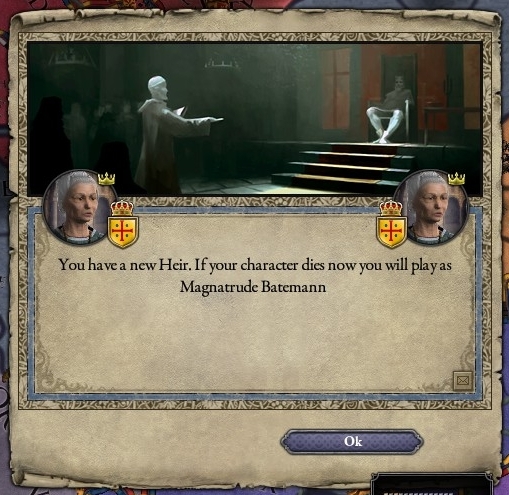  : His vassals agreed, and an unmarried Middle Francian woman with no titles to herself was named the Norman heir. At least she wasn't a Muslim. : His vassals agreed, and an unmarried Middle Francian woman with no titles to herself was named the Norman heir. At least she wasn't a Muslim.Madame de Beaumont looks at their grim captain and the Caravan, assembled before her.  : I trust that is enough for the day's travels? : I trust that is enough for the day's travels?The captain nods.  : Then I will see you all in the morning. : Then I will see you all in the morning.She makes her way below deck, and settles into a hammock. It is a tough road for an old woman, but she manages. As she drifts off to sleep, she dreams of Creat, and for a night, she's no longer Madame de Beaumont. She's just Sophie.
|
|
|
|
History Update 6 - Crusades and Inquisitions So, with our setting moved from Afghanistan to Normandy, our history updates will move accordingly. Today, we're going to talk about the Cathars. Of course, since everything is interconnected, we're not actually going to discuss Cathars just yet. Instead, we're going to discuss the Bogomilists. 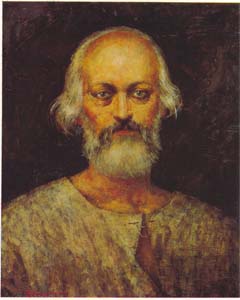 Bogomil himself was a priest in the Bulgarian Empire in late tenth century. Unfortunately, very little is known about Bogomil himself, other than what was written by priests attempting to discredit him. Most of the information we have comes from a sermon titled "Sermon Against the Heretics", so you can kind of see the inherent bias in this. Nonetheless, Bogomil ("Dear to God") preached in the Bulgarian Empire, trying to get back to what he thought were the roots of the Christian church. His direction included the focus on Jesus Christ of the New Testament and God of the Israelites of the Old Testament as being two distinct, and opposing, deities. This goes back to Marcionism (a heresy from all the way back in 144 in Eastern Anatolia) by the way of Paulicians (a later heresy from 7th century Anatolia). The idea is that the God of the Old Testament is the creator of all things material, a malevolent demiurge. He became Satan, and he's locked in opposition against Jesus. At this point, I'll honestly just quote Encyclopedia Britannica, because poo poo's pretty crazy: "The Bogomils taught that God had two sons, the elder Satanail and the younger Michael. The elder son rebelled against the father and became the evil spirit. After his fall he created the lower heavens and the earth and tried in vain to create man; in the end he had to appeal to God for the Spirit. After creation Adam was allowed to till the ground on condition that he sold himself and his posterity to the owner of the earth. Then Michael was sent in the form of a man; he became identified with Jesus, and was "elected" by God after the baptism in the Jordan. When the Holy Ghost (again Michael) appeared in the shape of the dove, Jesus received power to break the covenant in the form of a clay tablet (hierographon) held by Satanail from Adam. He had now become the angel Michael in a human form; as such he vanquished Satanail, and deprived him of the termination -il = God, in which his power resided. Satanail was thus transformed into Satan. Through his machinations the crucifixion took place, and Satan was the originator of the whole Orthodox community with its churches, vestments, ceremonies, sacraments and fasts, with its monks and priests. This world being the work of Satan, the perfect must eschew any and every excess of its pleasure" -Encyclopedia Britannica Heresies are fun! 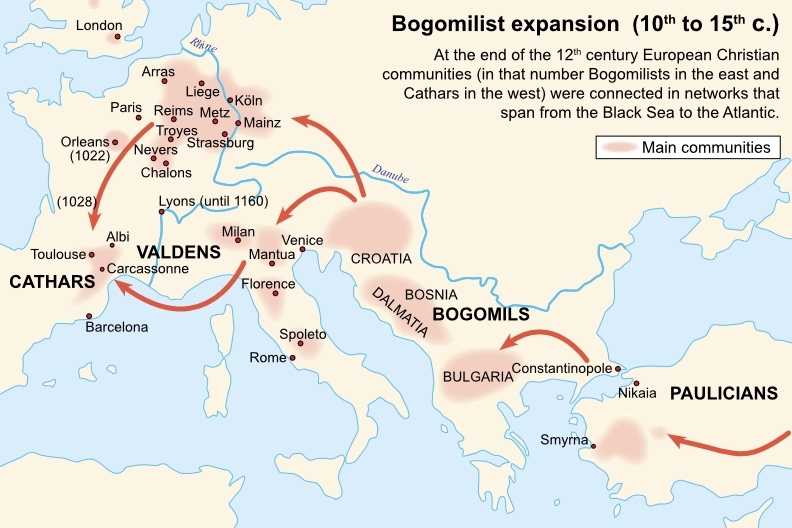 Anyway, Bogomils rejected the traditional church hierarchy and sacraments, and allowed women priests. They were also keen evengelists, spreading the word of Bogomil in their travels. They healed the sick, exorcised spirits, all that good stuff. In their travels, they got to the Adriatic coast, central Europe and southern France. This is where their teaching were somewhat changed over the next century, and we finally get to the Cathars. 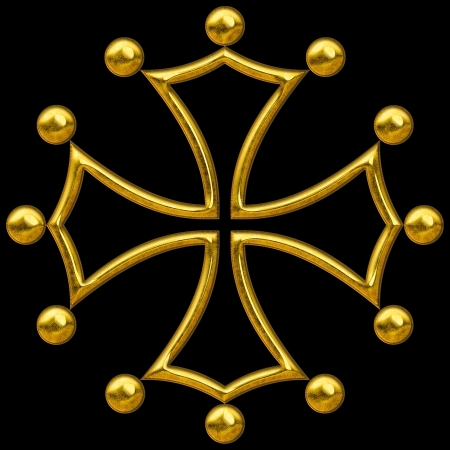 Let's settle the name first. "Cathar" comes from the Greek "Katharoi", meaning "the pure ones". However, the Cathars themselves didn't really refer to themselves as Cathars, it was more of a Catholic exonym. Instead, they called themselves "Bon Hommes" (French for "good men"). We will continue to refer to them as Cathars, because it makes my life easier. As with Bogomils earlier, most Cathar texts were destroyed by the Church as threats to the established doctrine, so we're keeping up with their opponents. And yet, even their opponents sometimes were pretty much on their side as far moral superiority goes: "If you question the heretic about his faith, nothing is more Christian; if about his daily converse, nothing more blameless; and what he says he proves by his actions ... As regards his life and conduct, he cheats no one, pushes ahead of no one, does violence to no one. Moreover, his cheeks are pale with fasting; he does not eat the bread of idleness; he labours with his hands and thus makes his living. Women are leaving their husbands, men are putting aside their wives, and they all flock to those heretics! Clerics and priests, the youthful and the adult among them, are leaving their congregations and churches and are often found in the company of weavers of both sexes." -St Bernard of Clairvaux Anyway, like the Bogomils, Cathars believed in the opposition of the demiurge and Jesus, and its transposition into our world as the material vs. the spiritual. They also had a weird ressurection doctrine that doesn't seem to show up in Bogomilism: in order to become perfect, and be reborn an angel, one must shed all connections to the material world. Practically reincarnation. If a follower was not purified before death, he would return to this sinful earth. They also avoided most Catholic sacraments, including baptism, since water is physical and thus cannot bring you closer to Jesus. In fact, they had only one sacrament: Consolamentum, which cleansed the soul and moved it closer to God. It was done upon conversion, and on the deathbed, to hedge their bets. 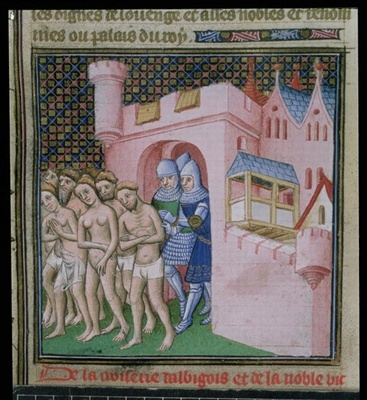 After the Consolamentum was done, a follower could spend three years of training, and become an ascetic. After a ceremony, the Holy Spirit would descend upon him, and he would become semi-angelic, a Perfect. The Perfecti, as they were called by the Catholics, abstained from any all violence (including eating meat), lived in absolute poverty and travelled through southern France in pairs, healing the sick and preaching to their followers, the Credents. They were also the ones administering the Consolmentum to the dying. Honestly, at this point, they sound a lot like Jain monastics. Not everyone could be a Perfect, of course, and most people were not expected to be. Credents did not have to follow the same ascetic lifestyle as the Perfecti. Since the spirit was the core of a person, and spirit was disconnected from the physical, it was sexless. As such, women faced remarkably little opposition in the Cathar world. They could be spiritual leaders, as was Mary Magdalene, they could become Perfecti (and may did), own property and all that good stuff. This was a significant factor in attracting female believers who could do nothing in the Catholic Church. 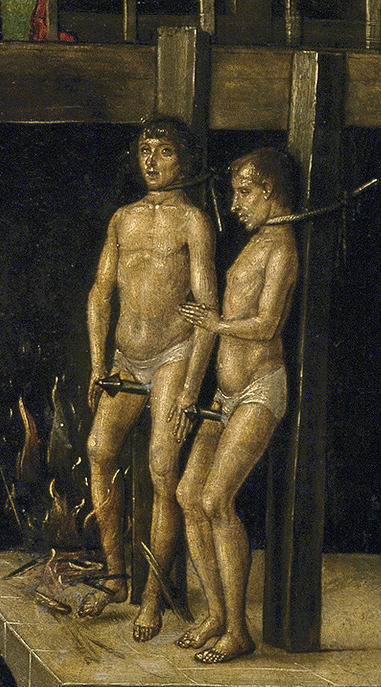 The Catholic Church, of course, were not the biggest fans of this asceting weirdness that was spreading through southern France. At first, they sent capable theologians to speak against the Cathars, including St. Bernard of Clairvaux, who later caught a lot of flak for the First Crusade failing. This didn't work in the slightest, and the movement grew. More peaceful conversion efforts followed, with very little results. In fact, the Perfecti were such excellent exemplars of faith and humility, that St. Dominic decreed that only preachers that displayed humility and asceticism could convert the Cathars. He founded the Domincan Order with the mission that "Zeal must be met by zeal, humility by humility, false sanctity by real sanctity, preaching falsehood by preaching truth". It worked slightly better, but not enough to stop the spread of heresy. Eventually, in 1208, a papal legate was killed on his way back from a mission to the region. Pope Innocent III then called for a crusade against the Cathars, called the Albigensian Crusade. The King of France, Phillip II, was eager to use this as an excuse to bringer stronger centralized control to the region, and sent his nobles south. This basically became somewhat of a French civil war, with the royal northerners fighting the southern nobles that refused such a blatant land grab by the crown. The war was over in twenty years, and Cathars were cut down in the thousands. 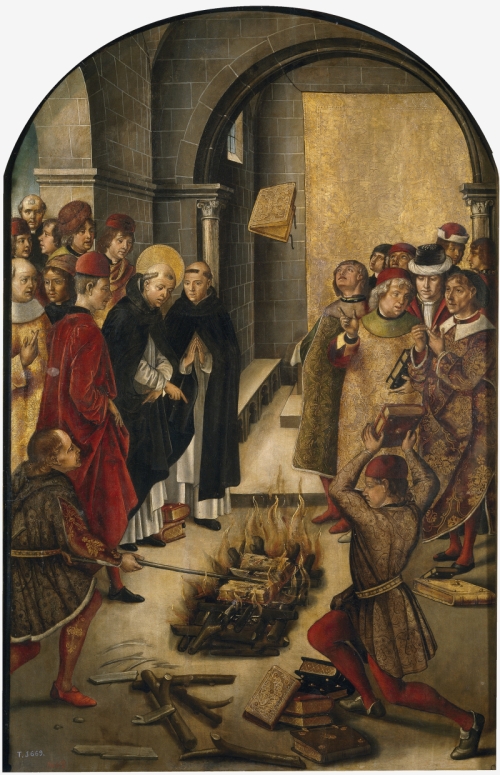 After the crusade was over, Innocent III was determined to root out the remaining Cathars in southern France, and established an Inquisition. Hanging, burning at the stake, and the other usual punishments for the heretics were abound, and drove the believers underground. The Inquisition also tracked down and burned the Cathar holy texts. The last recorded Cathar Perfect was burned by the Inquistion in 1321. The Cathars then basically disappeared as an organized movement, though some of their ideas, particularly on the rejection of the material, were adopted by the Waldensians in northern Italy and Germany, and eventually into some early Protestant movements. TL;DR: Southern French dualist ascetics pissed off the Catholics and got a Crusade and one of the first major Inquisitions started against them.
|
|
|
|
Film Update 6 - Forever is a Long Time So, since we've moved to a part of the world with a much larger variety of cinema than Afghanistan, we'll be dealing exclusively with French film for the next 100 years. I hope you like the New Wave and subtitles. I'll be honest, today's film isn't especially thematically appropriate. While it does feature a series of hasty marriages for security, a bastard, and a distant war, it doesn't quite approach them in the same way. However, it's a film set in Normandy, what more do you want.  Our film today is The Umbrellas of Cherbourg (Les Parapluies de Cherbourg), a 1964 French romantic musical directed by Jacques Demy. A story of waiting for love set in a small town on the Norman coast, it follows a young couple with big plans for their future. When Guy is called to war in Algeria for two years, they have to deal with a long-distance relationship, complicated by Genevieve getting pregnant and having another suitor.  An operatic musical, it is sung all the way through, with no spoken lines, and the lyrics are often operatically blunt. However, the music is great (you will recognize "Je ne Pourrai Jamais Vivre Sans Toi" as Connie Francis' "I Will Wait for You" featured in that one episode of Futurama with the dog), and the cinematography is top notch. The acting of both leads is also great, and Catherine Deneuve is just lovely. 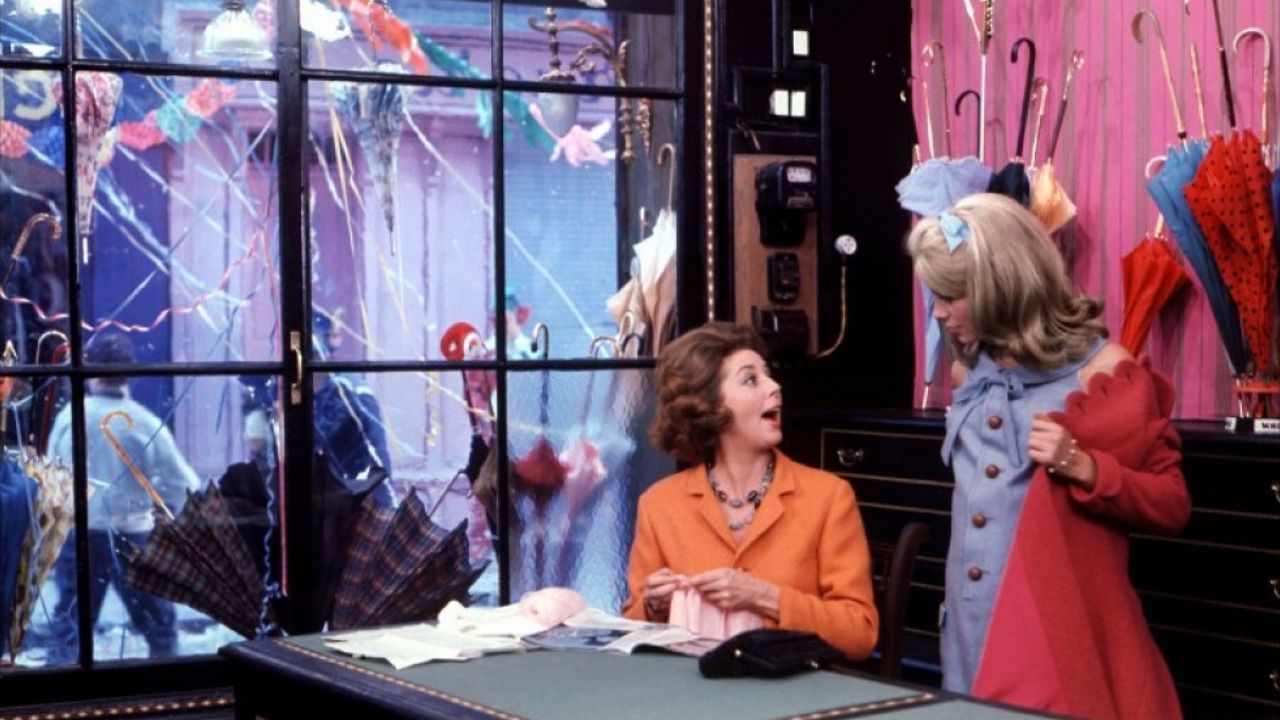 In summary, unless you hate the very concept of emotions expressed through song (or subtitles), you should check it out.
|
|
|
|
On an entirely unrelated note, I come to the thread with  a vote a vote . .The Catholic (and Cathar) holy sites are in Cantenbury, Koln, Santiago, Rome and Jerusalem. Santiago and Jerusalem have been in Muslim hands for a while. West Francia currently borders Koln, so grabbing it after we've seized power (spoiler alert, we seize power) shouldn't be too hard. Cantenbury is in England, but honestly a short jaunt across the Channel shouldn't be a problem. Taking them both will give us two Cathar holy sites, and reduce Catholicism to just Rome. However! This will most likely trigger the Crusades early, and we'll get our poo poo kicked in by the pissed off Catholic world. So I come to you to see what to do with it: A. Take Koln alone. We need to expand in that direction if we ever need to form an Empire anyway. Also, gently caress dealing with England. B. Take Cantenbury alone. Leave the filthy Germans to do filthy German things. Form an empire around the Channel. C. Take both. Leave no Catholic standing. March on Rome! Eternal Holy War! (quick reminder, we have 89 years left with the Batemanns. Rome is unlikely) D. Take neither. We have plenty other expansion options, including Brittany and the Muslim south. Also taking names for the kingdom after we hang the last Karling from the nearest tree. Kayten fucked around with this message at 07:14 on Aug 9, 2015 |
|
|
|
A take Koln alone for now. We can head for Cantenbury later.
|
|
|
|
A. Stay away from england!
|
|
|
|
C. If the wiki is correct heretics only trigger early crusades if they take Rome. Koln and Paris only trigger them if you're non-Christian. Give those dirty papists what for!
|
|
|
|
C. Take it all!
|
|
|
|
C! Everything or nothing, what's life without a gamble, etc. Also, just keep France as the name. Sure it is the most boring option but seeing how the country was named after the populace, which unless I'm mistaken are still Franks...
|
|
|
|
B, make the Channel Cathar
|
|
|
|
A. Koln is easiest to take, and I stand by my desire to see the Normans stay out of England.
|
|
|
|
To be fair, we're not Norman, we're French. I don't think Norman culture even formed, the vikings never actually took any land.
|
|
|
|
A Koln. England's for nerds and vikings.
|
|
|
|
DivineCoffeeBinge posted:C. Take it all! What this man said!
|
|
|
|
C Cathar triumphant!
|
|
|
|
C. Also, rename Canterbury to Catenbury after we take it. In finest CKII nomenclature tradition, our kingdom shall be known as Batemannids
|
|
|
|
Update 7 - Vive La France! The waves gently rock the ship. Madame de Beaumont walks out on deck, hiding from the wind, wrapping herself in her shirts. She sits down next to their captain, and stares at the stars. The captain says nothing. She sighs.  : I suppose you'd want your toll now. : I suppose you'd want your toll now.The figure nods slowly, and raises the sails to catch the wind.  : We did not hold Mass, of course. But that winter, a great feast was held in Rouen around Christmas, one that rivaled even my uncle's. Creat had even invited a Bon Homme to speak with us about the struggle against the demiurge. : We did not hold Mass, of course. But that winter, a great feast was held in Rouen around Christmas, one that rivaled even my uncle's. Creat had even invited a Bon Homme to speak with us about the struggle against the demiurge.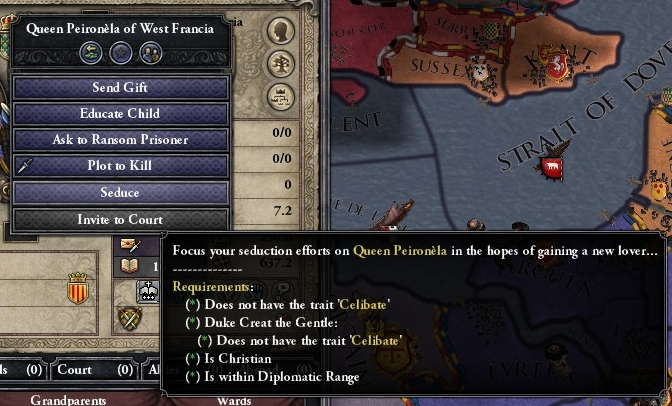  : There were whispers around the court that Creat had spent a great deal of time with the Queen over the week-long celebration. : There were whispers around the court that Creat had spent a great deal of time with the Queen over the week-long celebration.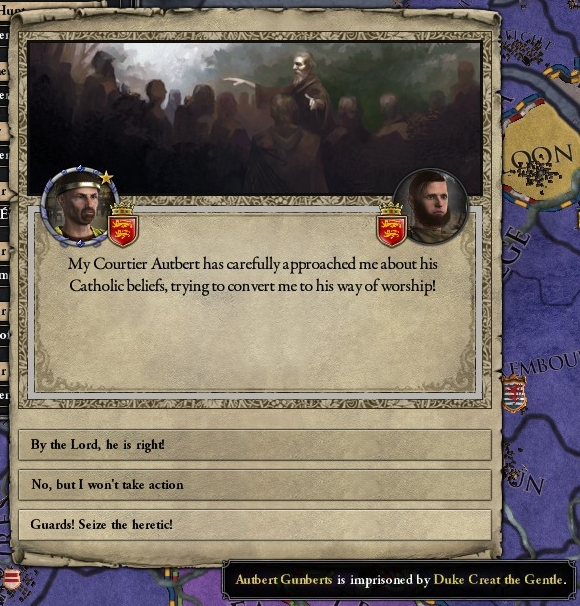  : His sister's husband, a filthy Catholic, had dared to challenge the travelling Bon Homme during his speech. It did not end well for him. : His sister's husband, a filthy Catholic, had dared to challenge the travelling Bon Homme during his speech. It did not end well for him. : I hear he rots in the dungeons of Rouen even now. : I hear he rots in the dungeons of Rouen even now.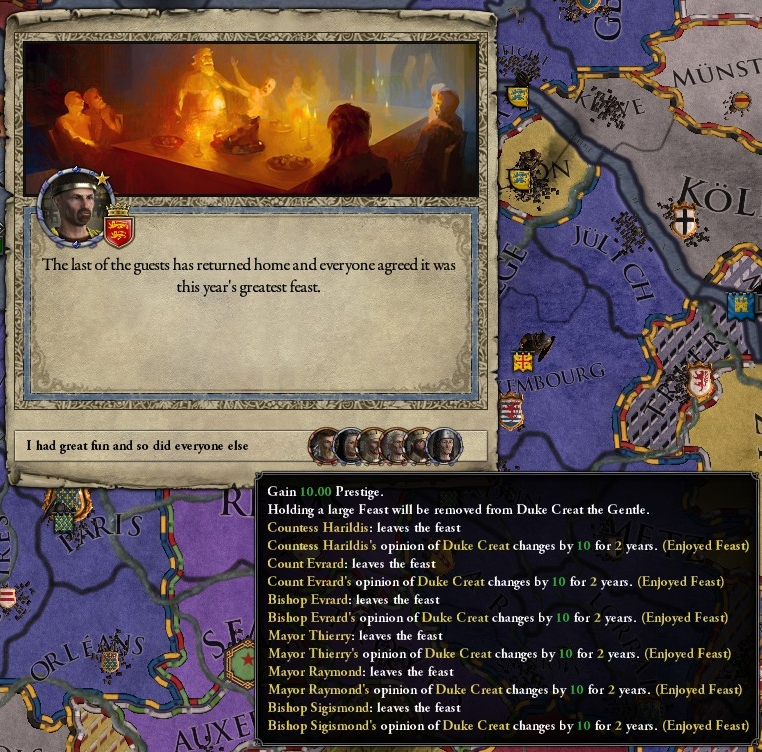  : Despite such... unpleasantness, the rest of the winter feast was enchanting. There were fire-eaters, and dancers, and even a bard from the south. My uncle fumed in his seat. : Despite such... unpleasantness, the rest of the winter feast was enchanting. There were fire-eaters, and dancers, and even a bard from the south. My uncle fumed in his seat.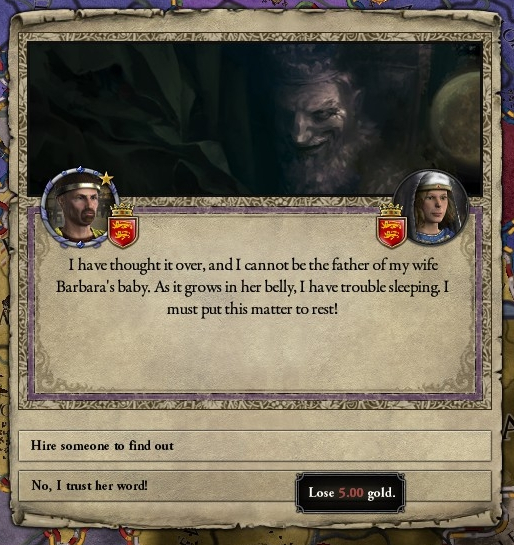  : And yet, the court whispered, as it does. Some said Barbara, the Duc's beautiful wife, had spent too many evening strolls with a count from Lorraine, and that her belly grew large with his seed. : And yet, the court whispered, as it does. Some said Barbara, the Duc's beautiful wife, had spent too many evening strolls with a count from Lorraine, and that her belly grew large with his seed. : The Duc sent many spies to follow his wife, and spoke to her chambermaidsmaids, and read her letters. : The Duc sent many spies to follow his wife, and spoke to her chambermaidsmaids, and read her letters.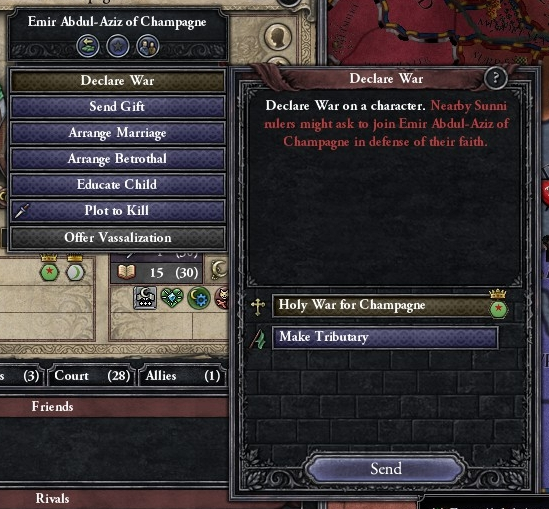  : To distract himself from the bastard spawn growing inside her, he marched on his brother's neighbours, the Frankish Muslims. Traitors to a man. : To distract himself from the bastard spawn growing inside her, he marched on his brother's neighbours, the Frankish Muslims. Traitors to a man. : The Rafids in Iberia were beseiged on all sides by a general, blessed by their Allah. He rallied the faithful against the Rafid decadence, claiming that they abandoned God. : The Rafids in Iberia were beseiged on all sides by a general, blessed by their Allah. He rallied the faithful against the Rafid decadence, claiming that they abandoned God.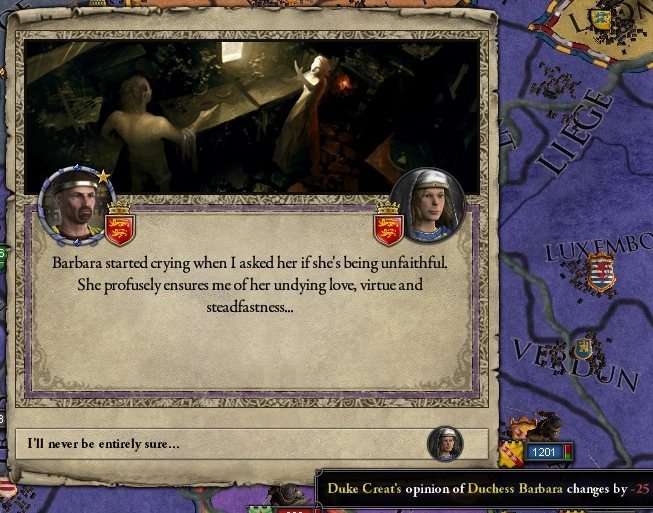  : Barbara wrote letters to the Duc as ordered the siege of Reims. I have heard they were stained with her tears, each page drenched in her sorrow. : Barbara wrote letters to the Duc as ordered the siege of Reims. I have heard they were stained with her tears, each page drenched in her sorrow.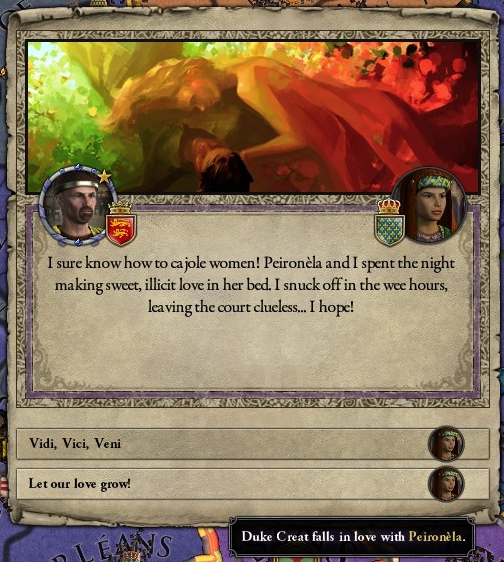  : Reims was only a day's ride from Paris, and some say the Duc was absent for a few days during the siege. The court rumours claimed he was in Paris, seen with the Queen strolling along the Seine. : Reims was only a day's ride from Paris, and some say the Duc was absent for a few days during the siege. The court rumours claimed he was in Paris, seen with the Queen strolling along the Seine.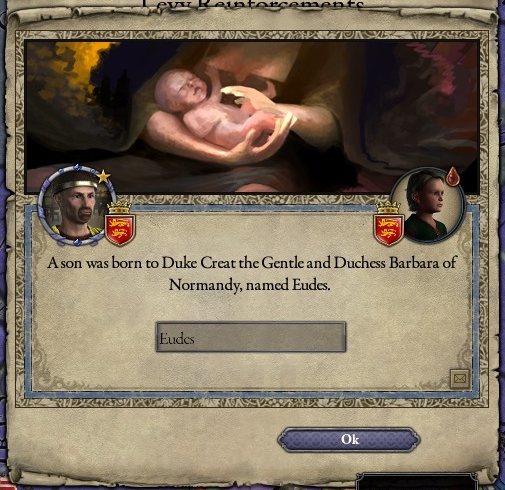  : Creat never accepted the little Eudes as his own. "Such a difficult child, and not too bright. How could he be mine?", he asked. : Creat never accepted the little Eudes as his own. "Such a difficult child, and not too bright. How could he be mine?", he asked.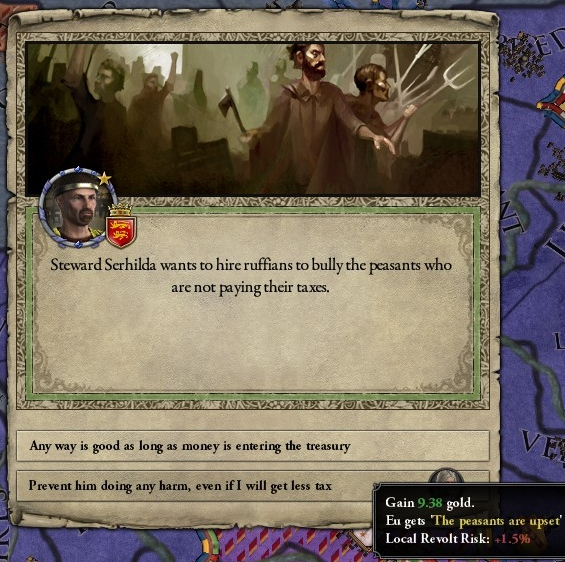  : The peasants in Eu, Catholics, and loyal to the Middle Francian Batemanns, refused to pay their taxes. With Creat's blessing, polite men walked through the towns, and the loyalists found their bones broken, and their fields burned. : The peasants in Eu, Catholics, and loyal to the Middle Francian Batemanns, refused to pay their taxes. With Creat's blessing, polite men walked through the towns, and the loyalists found their bones broken, and their fields burned.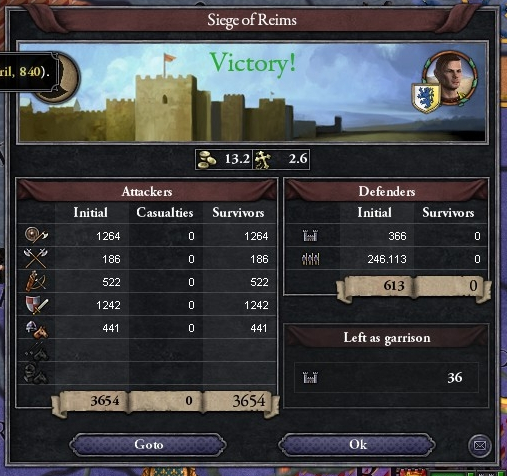  : After his short absense, the Duc charged the walls of Reims, until the last Muslim either dropped his pike or was cut down. : After his short absense, the Duc charged the walls of Reims, until the last Muslim either dropped his pike or was cut down.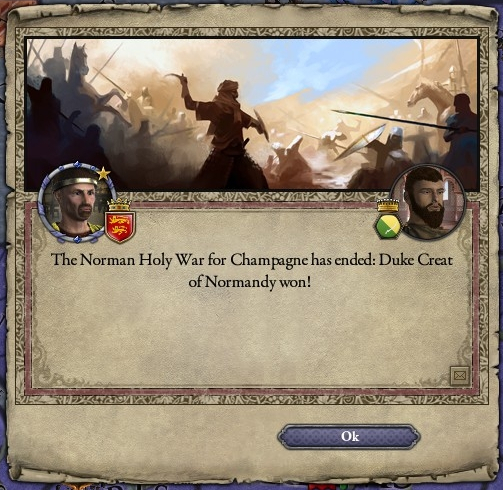  : Seeing the war turn against them, the garrisons of nearby towns abandoned the walls, and disappeared into the forest before Creat's armies fell onto them. Champagne was in the hands of the infidel no more. : Seeing the war turn against them, the garrisons of nearby towns abandoned the walls, and disappeared into the forest before Creat's armies fell onto them. Champagne was in the hands of the infidel no more.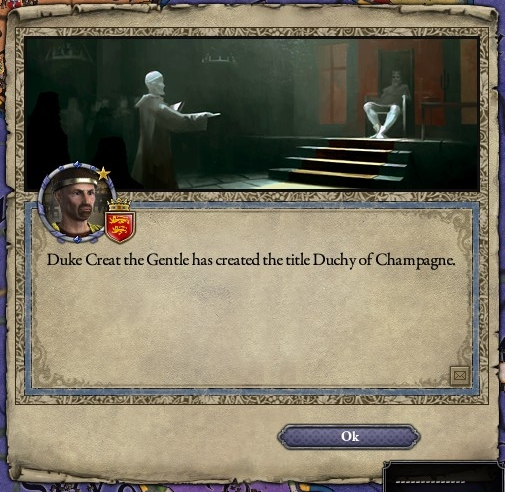  : With the wine lands his, Creat proclaimed himself to be two dukes: of Normandie, and of Champagne. : With the wine lands his, Creat proclaimed himself to be two dukes: of Normandie, and of Champagne.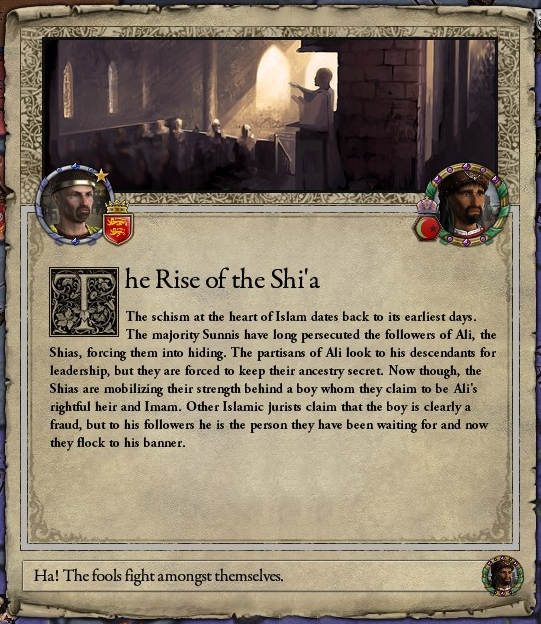  : This loss of land to the faithful cast doubts on the Muslims. More Muslim heretics rose up, and marched on the Rafids. : This loss of land to the faithful cast doubts on the Muslims. More Muslim heretics rose up, and marched on the Rafids.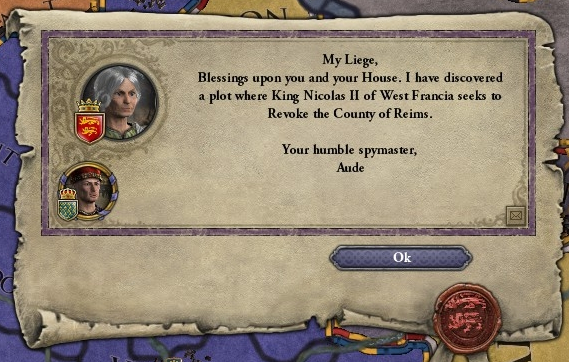  : Reims was close to Paris, too close. My uncle feared being closed in from two sides by Creat's lands, and sent his men to find a reason to hold that land. : Reims was close to Paris, too close. My uncle feared being closed in from two sides by Creat's lands, and sent his men to find a reason to hold that land.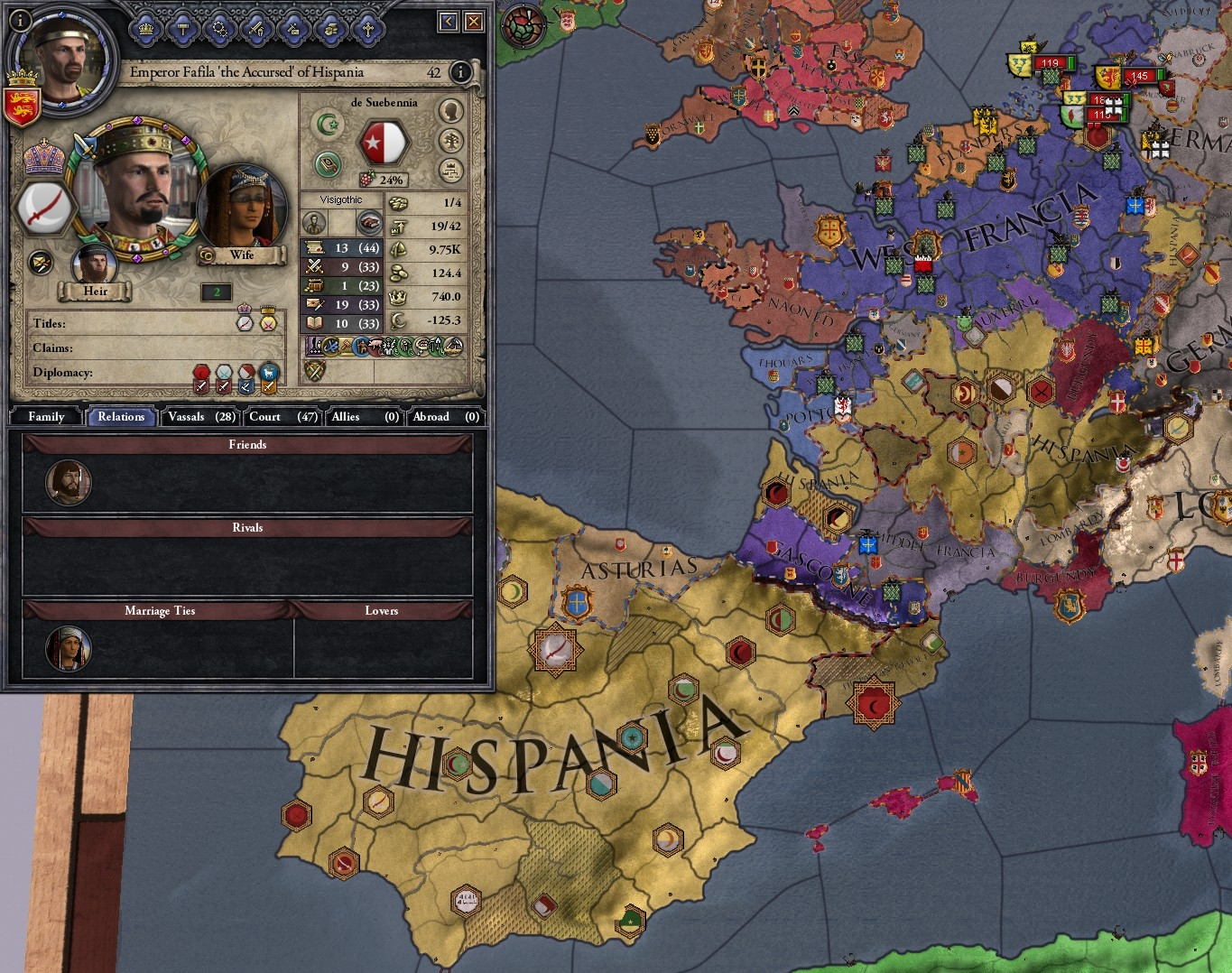  : The Muslim general far to the south marched into the Rafid palace, and ran a sword though the last Rafid. He then proclaimed himself the true emperor of Hispania. A strange man, a child of a Visigoth concubine, he was nonetheless a descendant of the Prophet himself, securing his claim for the throne. : The Muslim general far to the south marched into the Rafid palace, and ran a sword though the last Rafid. He then proclaimed himself the true emperor of Hispania. A strange man, a child of a Visigoth concubine, he was nonetheless a descendant of the Prophet himself, securing his claim for the throne. : The Duc travelled back home after his great victory, and his retinue stopped at my father's castle. This was the first time I laid my eyes on Creat. I said the silliest things as I set next to him. : The Duc travelled back home after his great victory, and his retinue stopped at my father's castle. This was the first time I laid my eyes on Creat. I said the silliest things as I set next to him.Madame de Beaumont smiles. She sees the rest of the Caravan assembled before her, hanging on her every word. She quickly composes herself.  : I was such a child then. And he, such a hero. : I was such a child then. And he, such a hero.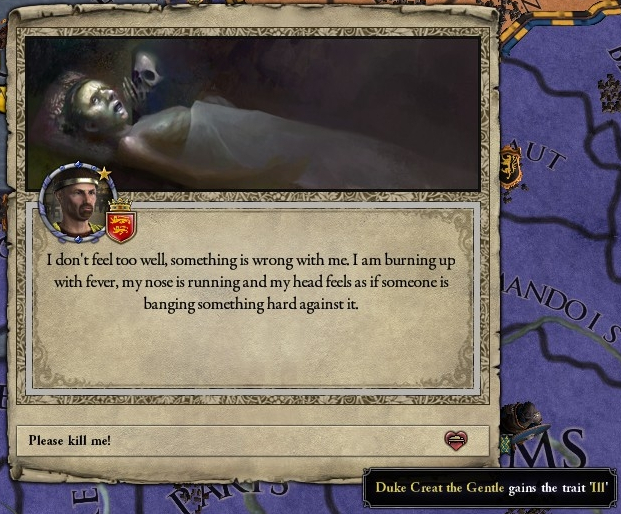  : That night, the duke fell with fever. My father insisted he stay at Beaumont until the fever breaks. I was to help him in any way I could. : That night, the duke fell with fever. My father insisted he stay at Beaumont until the fever breaks. I was to help him in any way I could. : And so I did. Even bedridden and burning with fever, he was funny, and kind, and he just... listened. So I helped. As I could. : And so I did. Even bedridden and burning with fever, he was funny, and kind, and he just... listened. So I helped. As I could.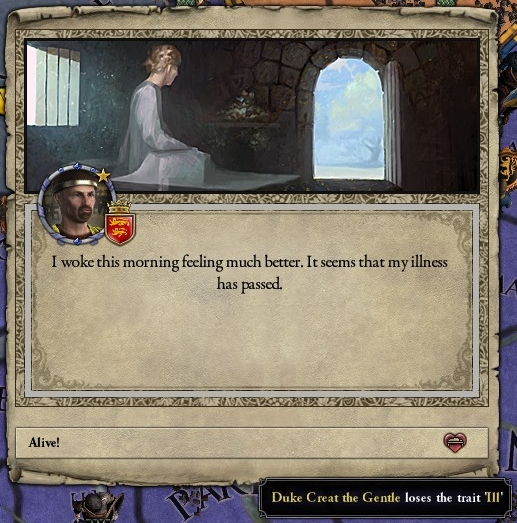  : Perhaps my help worked. But two days past, he was running again, and barking orders at his page, and setting off to Rouen. He asked my father if I would like to go with him to the capital, and my father, eager for me to see the world, said yes. : Perhaps my help worked. But two days past, he was running again, and barking orders at his page, and setting off to Rouen. He asked my father if I would like to go with him to the capital, and my father, eager for me to see the world, said yes.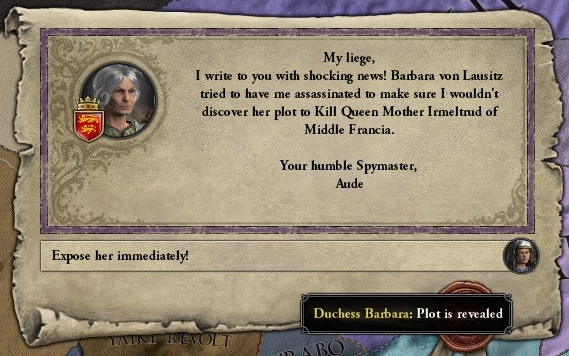  : I rode with him to Rouen, and hanged on every word he spoke. I read his letters to him, and saw his face fall when he heard Barbara was seeing the apothecaries in Middle Francia. : I rode with him to Rouen, and hanged on every word he spoke. I read his letters to him, and saw his face fall when he heard Barbara was seeing the apothecaries in Middle Francia.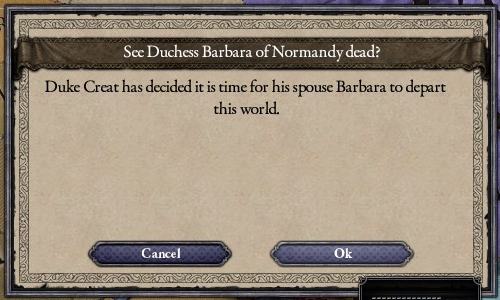  : So when we came to Rouen, he told me he had a very important task for me. I was to meet with several Norman nobles in secrecy, and to pass them letters he wrote without his seal. : So when we came to Rouen, he told me he had a very important task for me. I was to meet with several Norman nobles in secrecy, and to pass them letters he wrote without his seal.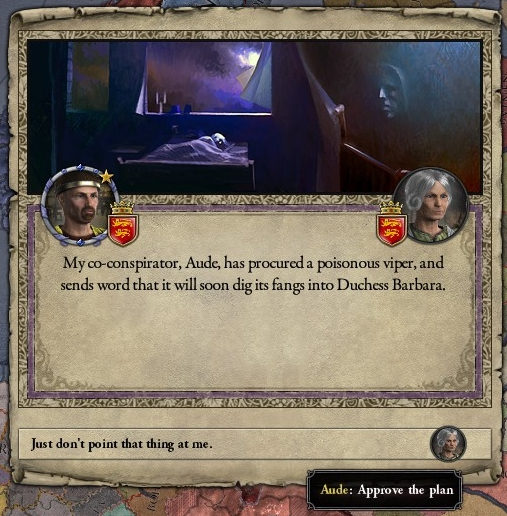  : I spoke to seven of them, and I carried their letters back to him. Eventually, Aude, Comtesse d'Amiens, gave me a small parcel I was to deliver to Barbara, a gift from the faithful in Normandy. : I spoke to seven of them, and I carried their letters back to him. Eventually, Aude, Comtesse d'Amiens, gave me a small parcel I was to deliver to Barbara, a gift from the faithful in Normandy.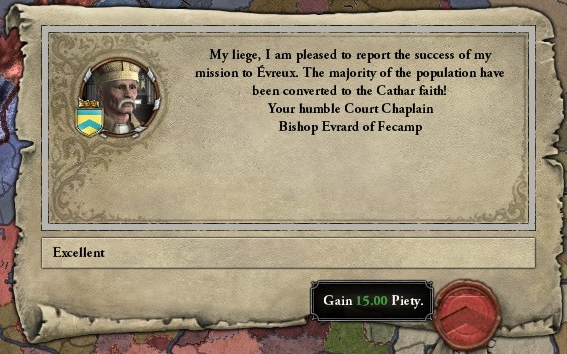  : I returned to the castle, and gave the parcel to a chambermaid of the duchesse. I returned to court just in time to hear the great news, that no more Catholics remained in Evreaux. : I returned to the castle, and gave the parcel to a chambermaid of the duchesse. I returned to court just in time to hear the great news, that no more Catholics remained in Evreaux.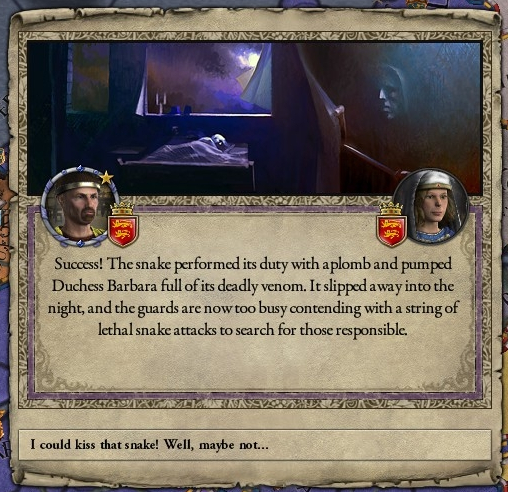  : That night, as I helped the Duc again, I heard a terrible scream. The castle guard clanged in their armour as they ran to the duchesse's chambers. The poor Barbara lay died, with twin snake bites on her wrist. The comtesse's parcel was on the ground next to her, barely opened. As the guards ran around looking for the snake, I took the parcel and hid it under my skirts. : That night, as I helped the Duc again, I heard a terrible scream. The castle guard clanged in their armour as they ran to the duchesse's chambers. The poor Barbara lay died, with twin snake bites on her wrist. The comtesse's parcel was on the ground next to her, barely opened. As the guards ran around looking for the snake, I took the parcel and hid it under my skirts.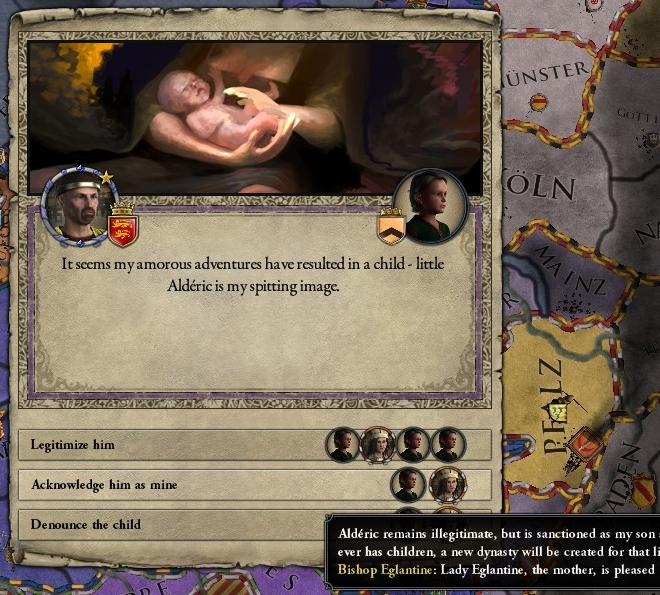  : I knew I wasn't the only one helping him, of course. There was a long line of children born to church women. His "confessors". : I knew I wasn't the only one helping him, of course. There was a long line of children born to church women. His "confessors".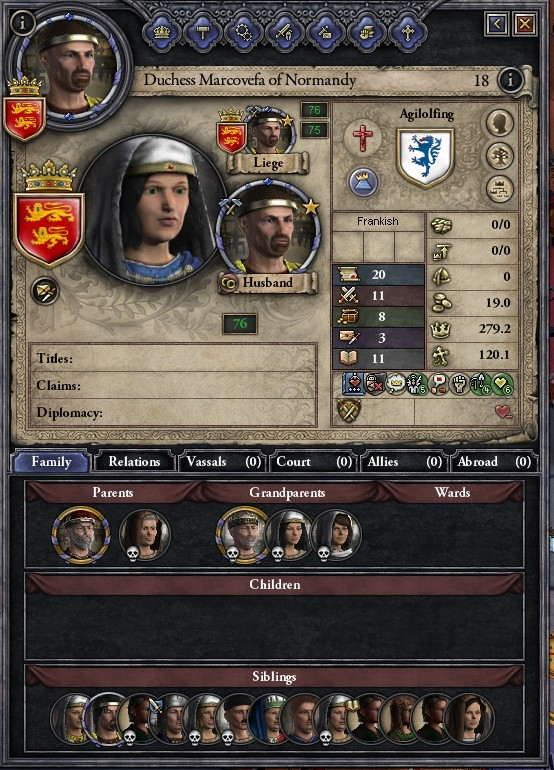  : After mourning over Barabara's untimely death, the Duc found a new wife. "It's all politics, Sophie" he used to say. Like she didn't mean anything to him. : After mourning over Barabara's untimely death, the Duc found a new wife. "It's all politics, Sophie" he used to say. Like she didn't mean anything to him.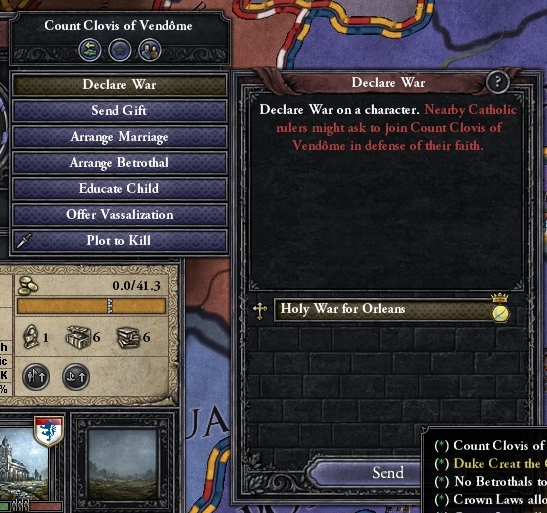  : Soon after the wedding, he marched south to war against the count of Vendome, a filthy Catholic. I stayed at his court. : Soon after the wedding, he marched south to war against the count of Vendome, a filthy Catholic. I stayed at his court.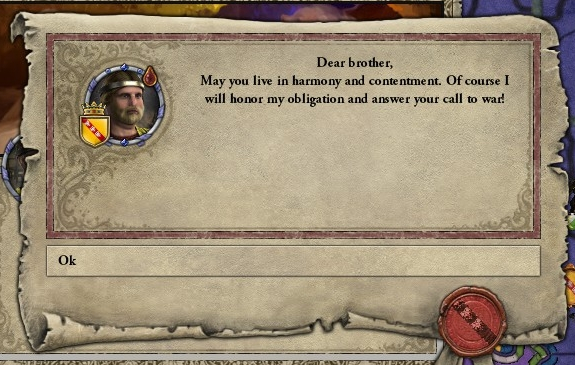  : He wrote to me. Week after week, the pigeons delivered letters with his seal to me. He wrote me of his brother, who grew into a fine young man, and joined him in the siege. : He wrote to me. Week after week, the pigeons delivered letters with his seal to me. He wrote me of his brother, who grew into a fine young man, and joined him in the siege.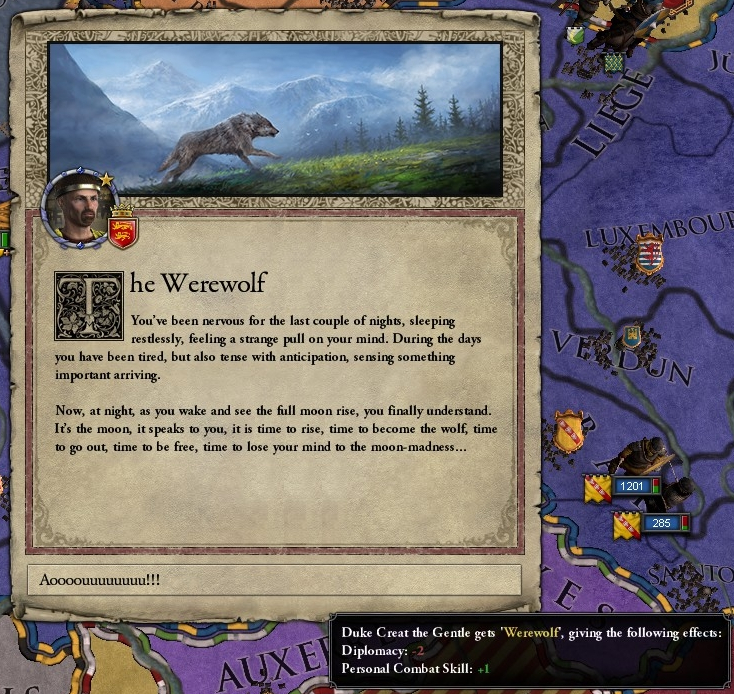  : He wrote a lot about the moon. There was something haunting about it, he said. It called to him some nights. : He wrote a lot about the moon. There was something haunting about it, he said. It called to him some nights.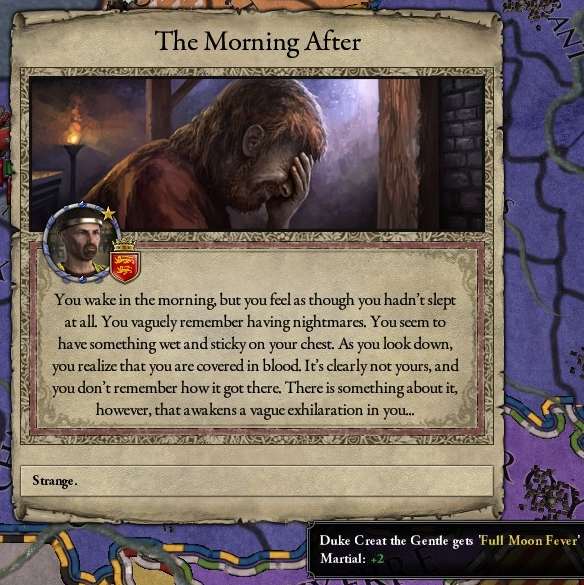  : It clouded his mind, and gave him strange thoughts. : It clouded his mind, and gave him strange thoughts.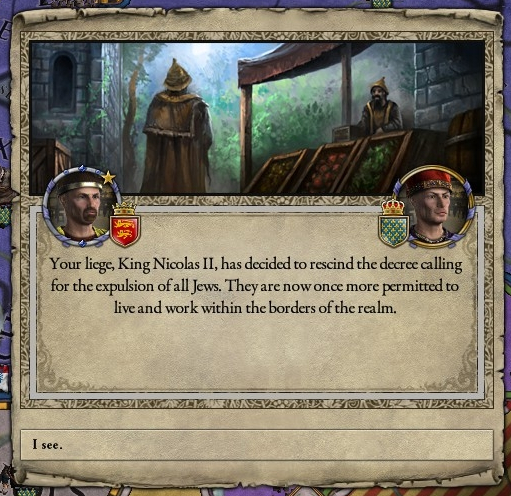  : And I, a faithful companion as ever, wrote to him of court matters. I told him how my uncle met a wise Jewish man from the East who convinced him to let the Hebrews back in the Kingdom. : And I, a faithful companion as ever, wrote to him of court matters. I told him how my uncle met a wise Jewish man from the East who convinced him to let the Hebrews back in the Kingdom.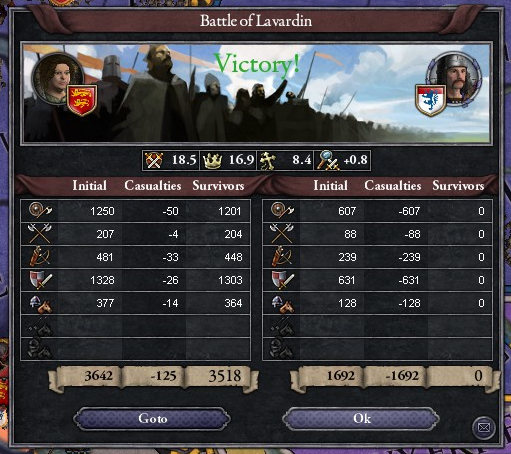  : His letters spoke of the armies of the faithful breaking through the ranks of the Catholics, a true miracle of Jesus. : His letters spoke of the armies of the faithful breaking through the ranks of the Catholics, a true miracle of Jesus.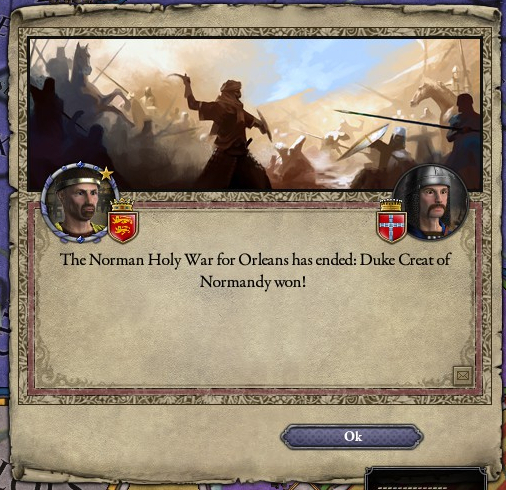  : And then he wrote that Vendome fell. Truly, Jesus has been with us. He was coming home. : And then he wrote that Vendome fell. Truly, Jesus has been with us. He was coming home.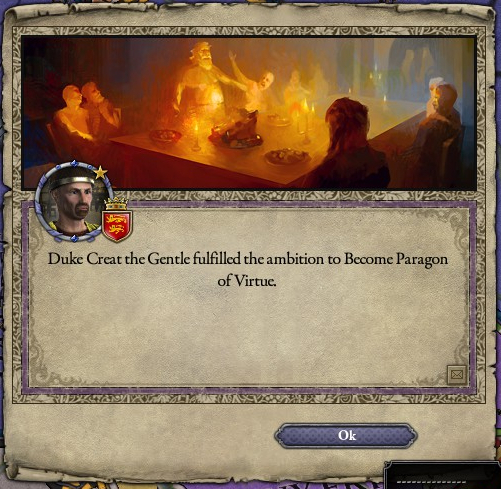  : He returned a hero. A defender of the faith. : He returned a hero. A defender of the faith.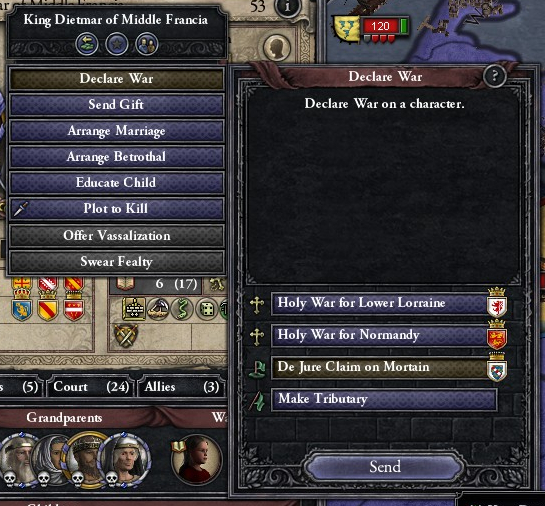  : But he would not stay long. The Eastern Batemanns lost their seat of power in Middle Francia. He marched on their remaining lands in Normandy as soon he's heard. : But he would not stay long. The Eastern Batemanns lost their seat of power in Middle Francia. He marched on their remaining lands in Normandy as soon he's heard.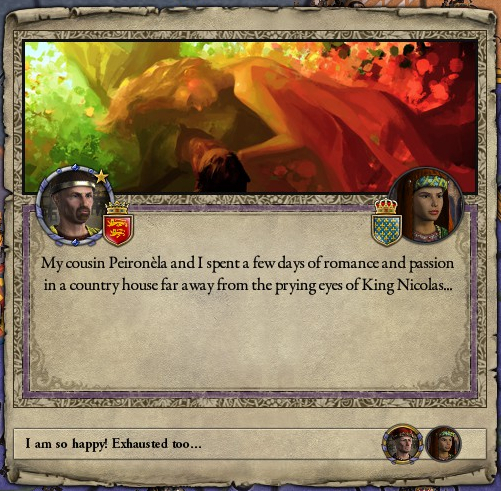  : I wrote him of the court rumours. The nobles whispered that my uncle's queen slipped the Paris court and went to Normandy. All false, of course. : I wrote him of the court rumours. The nobles whispered that my uncle's queen slipped the Paris court and went to Normandy. All false, of course.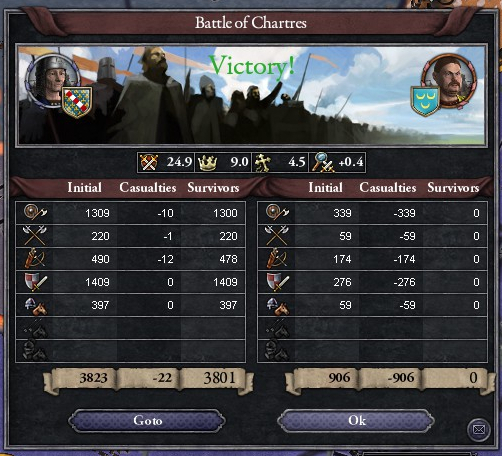  : He wrote to me of strategy, and battles past. Middle Francia was three kingdoms in one: to our east, to our south, and in Normandy. The King's armies had to travel through my uncle's lands divided, and Creat's armies fell on them. : He wrote to me of strategy, and battles past. Middle Francia was three kingdoms in one: to our east, to our south, and in Normandy. The King's armies had to travel through my uncle's lands divided, and Creat's armies fell on them.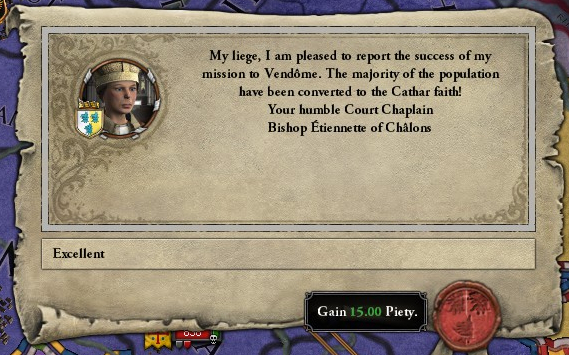  : As the armies of the faithful fell on the Catholics in the field, so did the peasants of the Duc's lands embraced the teachings of the Bons Hommes. The corruption of the church was bare for all to see, a black beating heart in an frail old man's chest. : As the armies of the faithful fell on the Catholics in the field, so did the peasants of the Duc's lands embraced the teachings of the Bons Hommes. The corruption of the church was bare for all to see, a black beating heart in an frail old man's chest.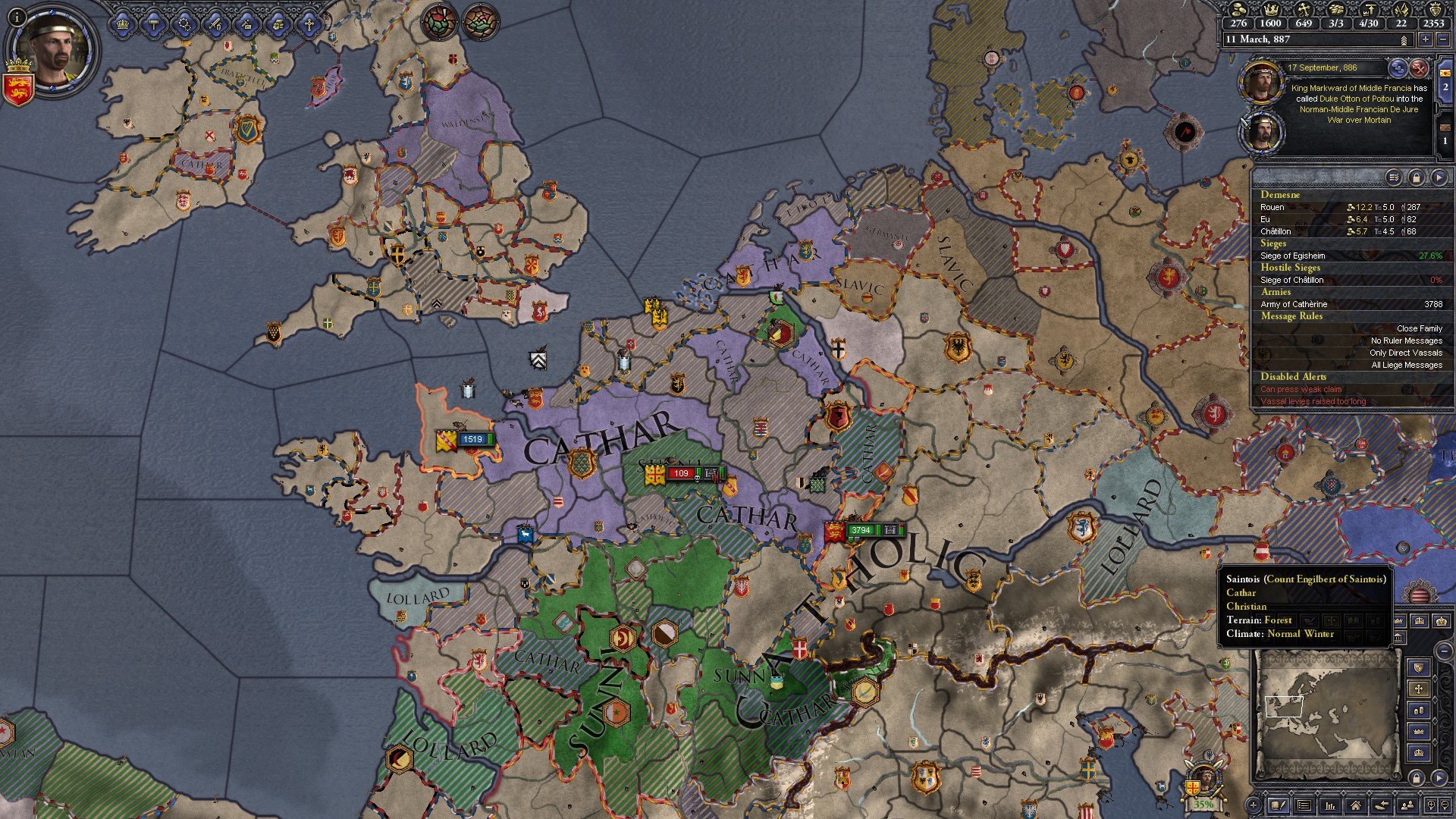  : It is a harsh burden on the bluebloods, but we must show the peasants how to live their lives according to the Bons Hommes. After decades, the peasants listened, and became closer to God. : It is a harsh burden on the bluebloods, but we must show the peasants how to live their lives according to the Bons Hommes. After decades, the peasants listened, and became closer to God.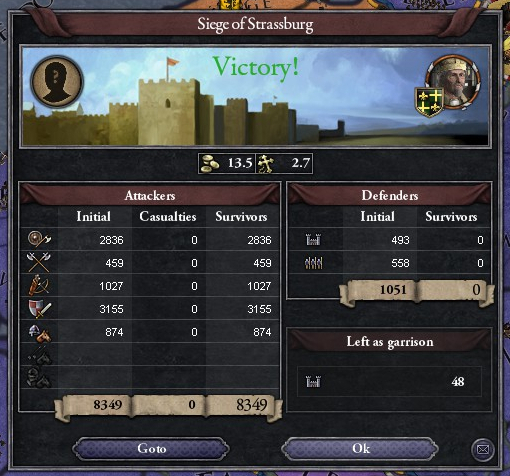  : Having conquered all of Middle Francia's western territories, the Duc marched east. He wrote me from Stassburg, where they laid siege to the King's court. He wrote me of the moon again. : Having conquered all of Middle Francia's western territories, the Duc marched east. He wrote me from Stassburg, where they laid siege to the King's court. He wrote me of the moon again.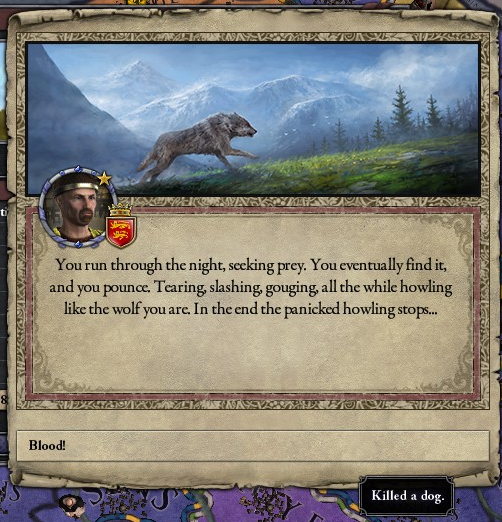  : He wrote that the moon brought to him the images of a glorious forest chase. A hunting dog, the tables turned, running for its life. The smell of fear, letting him track it over leagues upon leagues of forest. The panic in its eyes as great jaws held tight and drained life from its throat. : He wrote that the moon brought to him the images of a glorious forest chase. A hunting dog, the tables turned, running for its life. The smell of fear, letting him track it over leagues upon leagues of forest. The panic in its eyes as great jaws held tight and drained life from its throat.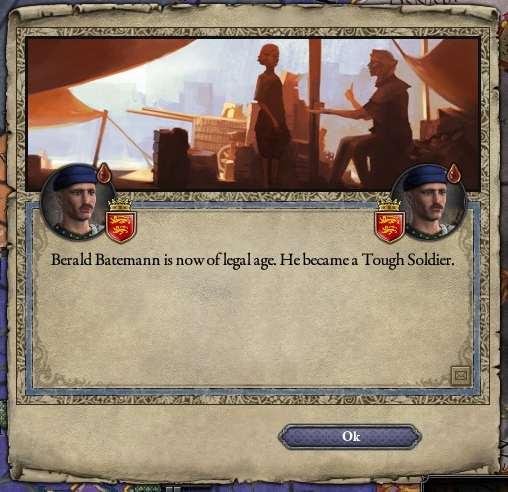  : And I wrote back, of my uncle's great crusade against Hispanian lands in Luxembourg. The great colours of Paris, of Karlings, flying over thousands of men, as they marched to their deaths. Scored of wives and husbands, praying for their safe return. : And I wrote back, of my uncle's great crusade against Hispanian lands in Luxembourg. The great colours of Paris, of Karlings, flying over thousands of men, as they marched to their deaths. Scored of wives and husbands, praying for their safe return.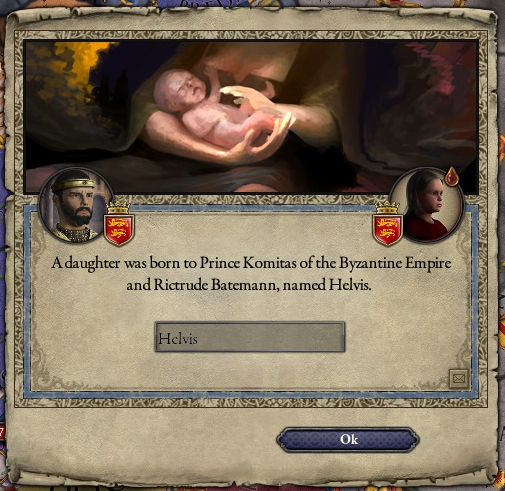  : I wrote him of his sister, the clever Rictrude, who trained his armies in Rouen. Her husband, man whose parents were too close, was an ugly, stupid man. His son took after him, a misshapen goblin, a blight on Rouen and all Christians. : I wrote him of his sister, the clever Rictrude, who trained his armies in Rouen. Her husband, man whose parents were too close, was an ugly, stupid man. His son took after him, a misshapen goblin, a blight on Rouen and all Christians.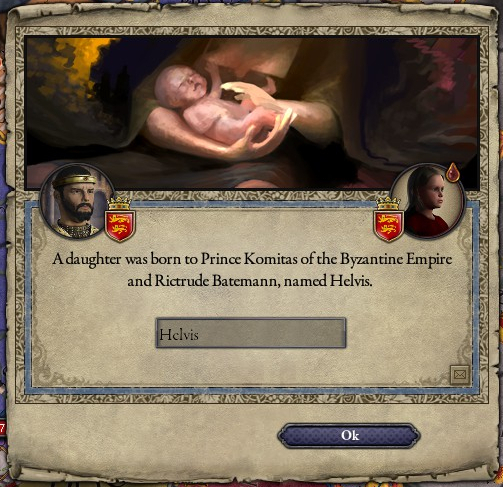  : But her daughters, her daughters were just... girls. Clever little children, they would run and play on the castle grounds. They would argue with their friends over their doll's hair, and their dress. Their father's sickness seemed to only affect the boys. : But her daughters, her daughters were just... girls. Clever little children, they would run and play on the castle grounds. They would argue with their friends over their doll's hair, and their dress. Their father's sickness seemed to only affect the boys. : Her husband soon died. I was at the funeral, and his body grew black with bile. A monster to the end. : Her husband soon died. I was at the funeral, and his body grew black with bile. A monster to the end.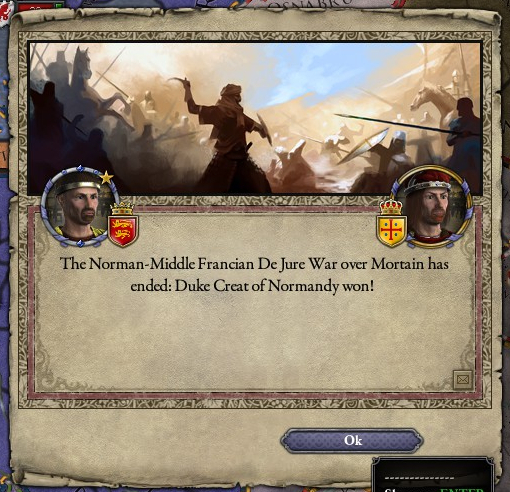  : He wrote that the Middle Francian King signed a treaty with a sword at his throat. Normandy belonged to the Bons Hommes. The Duc himself was summoned to Paris. : He wrote that the Middle Francian King signed a treaty with a sword at his throat. Normandy belonged to the Bons Hommes. The Duc himself was summoned to Paris. : I travelled to Paris to see my uncle, and, of course, to welcome the Duc back as a hero to the French. When I got to the court, there was a huge commotion. The Comte of Maine claimed his daughter was attacked by the Duc, and was with child. The Duc swore up and down that he was nowhere near the girl, or Maine itself. My uncle sat in judgement. : I travelled to Paris to see my uncle, and, of course, to welcome the Duc back as a hero to the French. When I got to the court, there was a huge commotion. The Comte of Maine claimed his daughter was attacked by the Duc, and was with child. The Duc swore up and down that he was nowhere near the girl, or Maine itself. My uncle sat in judgement.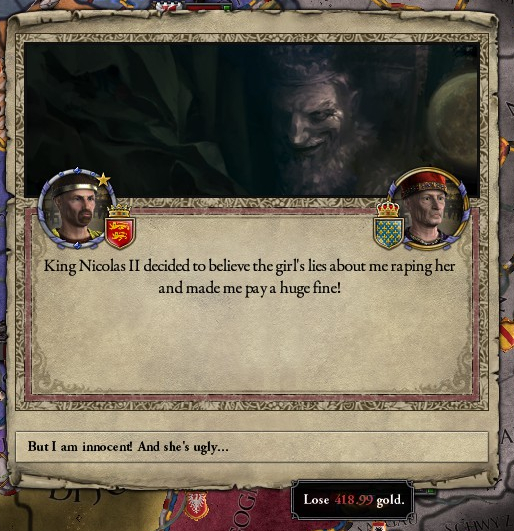  : And my uncle, fearing the great Duc, who won the hearts of the French, who took lands from the Muslims and the Catholics, who defended the northern lands against the Vikings, ruled against him. He proclaimed Creat a violator, and took Normandy's coffers as his own. The Duc rode to Rouen with none but me to comfort him, none but me to defend his honour. We rode in silence. : And my uncle, fearing the great Duc, who won the hearts of the French, who took lands from the Muslims and the Catholics, who defended the northern lands against the Vikings, ruled against him. He proclaimed Creat a violator, and took Normandy's coffers as his own. The Duc rode to Rouen with none but me to comfort him, none but me to defend his honour. We rode in silence.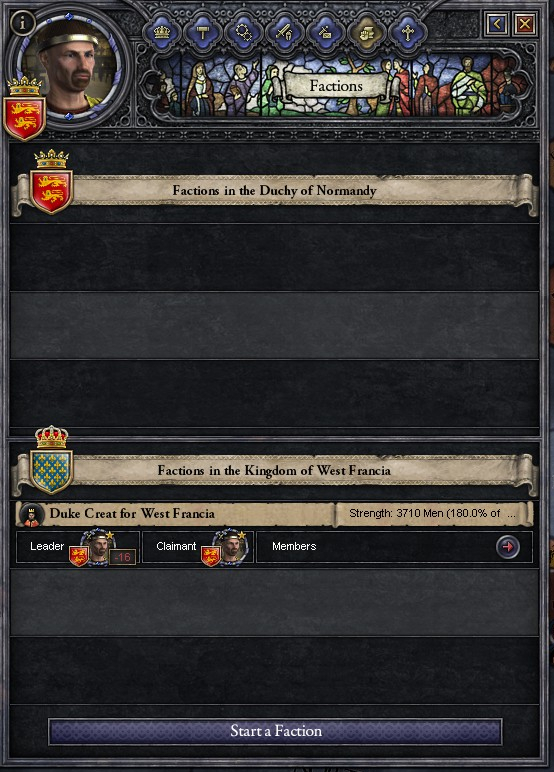  : For seven months the Duc remained in his castle, writing letters to his brother. He could barely walk up the steps, yet every day, he made the journey. Late into the night, he stayed in the tower by the pigeons and read and wrote. He and his sister yelled at each other, of battle plans, and soldiers, and honour. And after seven months, he sent one last letter. To my uncle, Nicholas II Karling, king of the Franks. : For seven months the Duc remained in his castle, writing letters to his brother. He could barely walk up the steps, yet every day, he made the journey. Late into the night, he stayed in the tower by the pigeons and read and wrote. He and his sister yelled at each other, of battle plans, and soldiers, and honour. And after seven months, he sent one last letter. To my uncle, Nicholas II Karling, king of the Franks.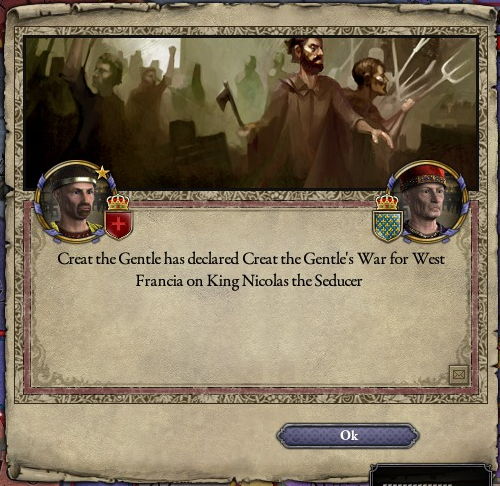  : The Duc named him an usurper, a filthy papist unworthy of the throne. A dying breed of an upstart dynasty, a Frank among Frenchmen. And he marched on Paris. : The Duc named him an usurper, a filthy papist unworthy of the throne. A dying breed of an upstart dynasty, a Frank among Frenchmen. And he marched on Paris.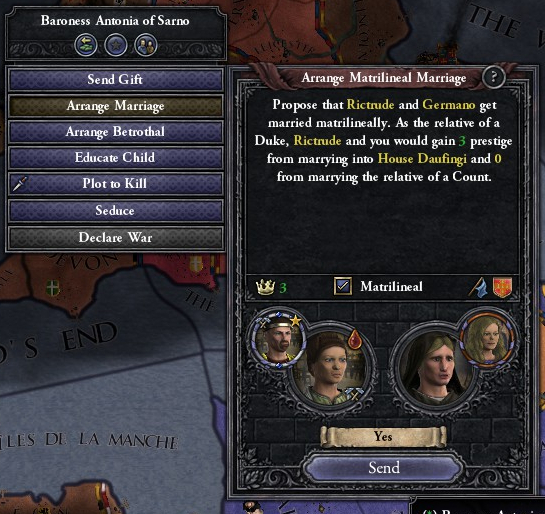  : His sister, the brilliant Rictrude, the greatest general of our age, was to marry a count from Germany. There was no love between them. But the Duc needed allies. : His sister, the brilliant Rictrude, the greatest general of our age, was to marry a count from Germany. There was no love between them. But the Duc needed allies.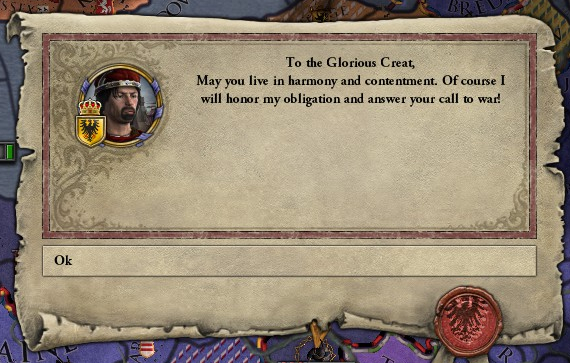  : The ceremony was brief. A Bon Homme, Rictrude, the aptly named Germano, and the Duc. As soon as the vows were said, the Duc sent a message to the king of the Germans, asking for men to take Paris. None could say no the Duc. : The ceremony was brief. A Bon Homme, Rictrude, the aptly named Germano, and the Duc. As soon as the vows were said, the Duc sent a message to the king of the Germans, asking for men to take Paris. None could say no the Duc.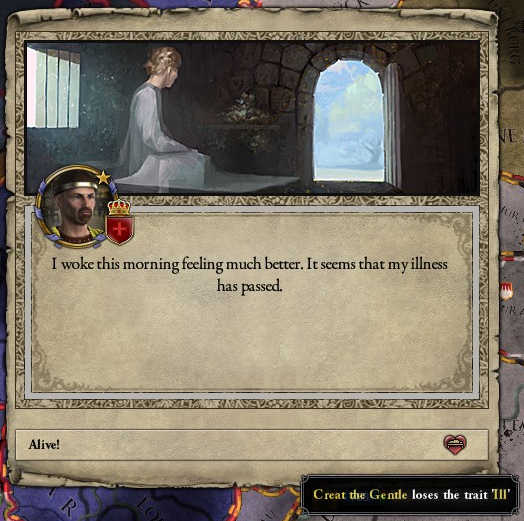  : With the news of the German alliance, the Duc gained colour in his cheeks and rode to meet his army at Paris. He had no time to say his good-byes. I understood, of course. He had a war to win. : With the news of the German alliance, the Duc gained colour in his cheeks and rode to meet his army at Paris. He had no time to say his good-byes. I understood, of course. He had a war to win.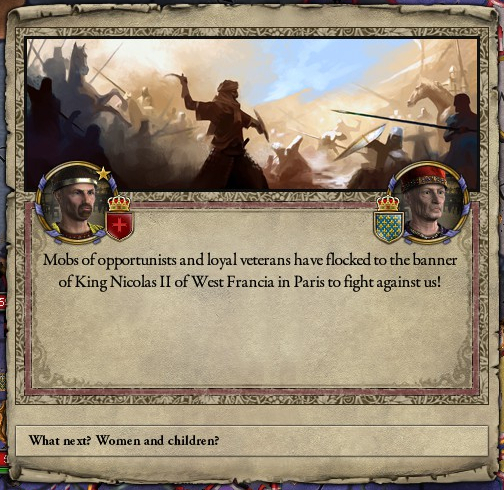  : The realm was split between the Batemanns and the Karlings. I suppose my uncle considered me a traitor, but I owed him no allegiance. Yet men and women of all walks of life took up arms to defend their false king. : The realm was split between the Batemanns and the Karlings. I suppose my uncle considered me a traitor, but I owed him no allegiance. Yet men and women of all walks of life took up arms to defend their false king.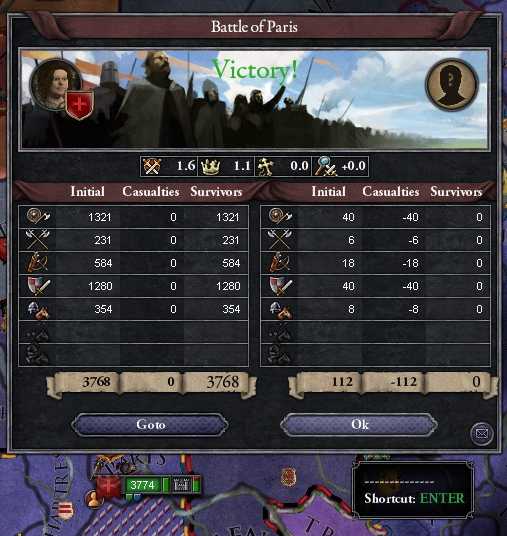  : They did not last long. : They did not last long.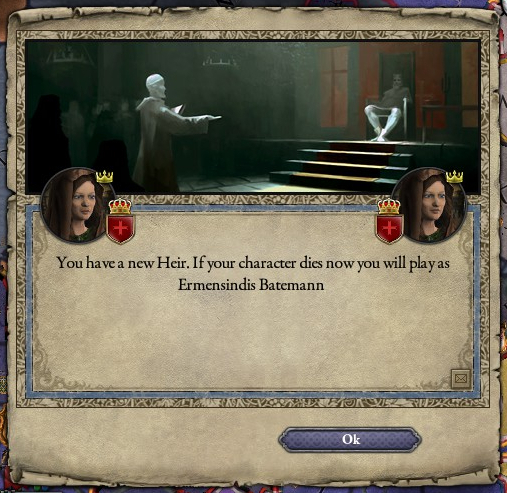  : The old woman that held claim to the Norman throne has passed away due to some plague or another. The Duc's aunt now stood next in line for the throne. : The old woman that held claim to the Norman throne has passed away due to some plague or another. The Duc's aunt now stood next in line for the throne.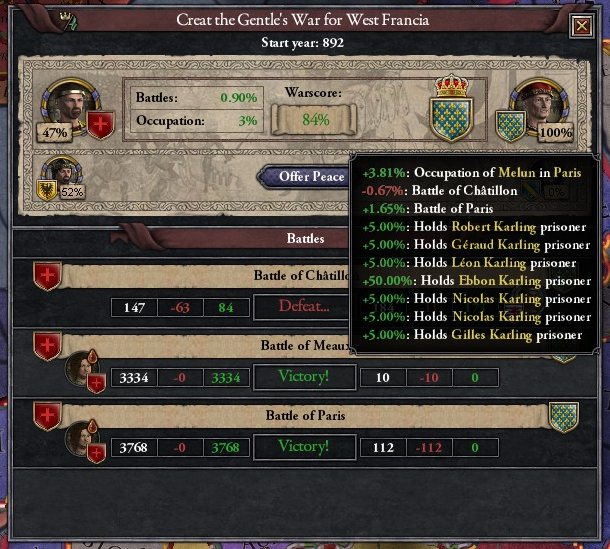  : Melun fell first. The Duc took the King's family hostage. His heir, and every successor that could be elected was thrown in the cells at Rouen. Paris was next. : Melun fell first. The Duc took the King's family hostage. His heir, and every successor that could be elected was thrown in the cells at Rouen. Paris was next.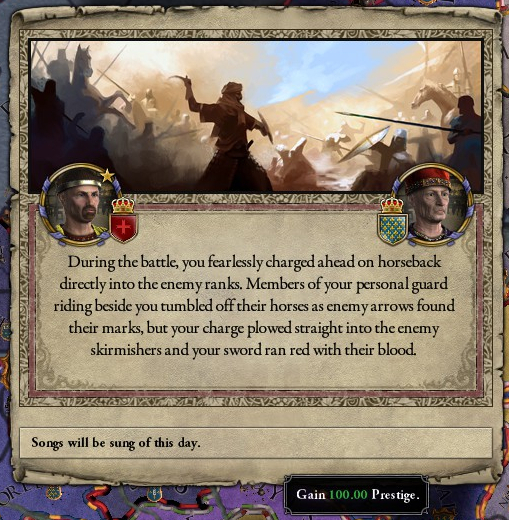  : The defenders of the small, backwards city tried a last and desperate sortie. The Duc met them first, on his great horse, cleaving through the armies, his sword glistening in the sun. A bard back at Rouen sang us a song of his holy charge. : The defenders of the small, backwards city tried a last and desperate sortie. The Duc met them first, on his great horse, cleaving through the armies, his sword glistening in the sun. A bard back at Rouen sang us a song of his holy charge.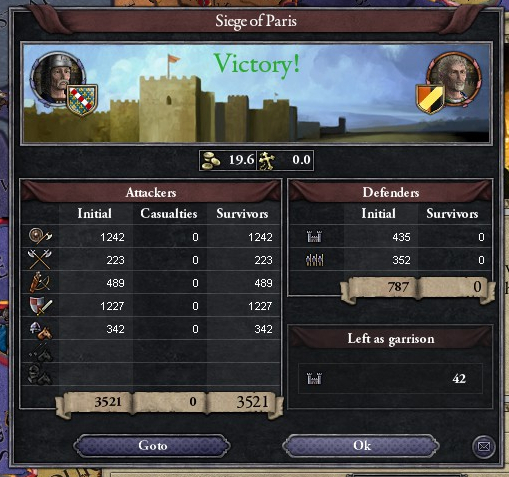  : The city fell after a month. My uncle was dragged in chains along the Seine, with the commoners throwing refuse, and chanting song against him. : The city fell after a month. My uncle was dragged in chains along the Seine, with the commoners throwing refuse, and chanting song against him.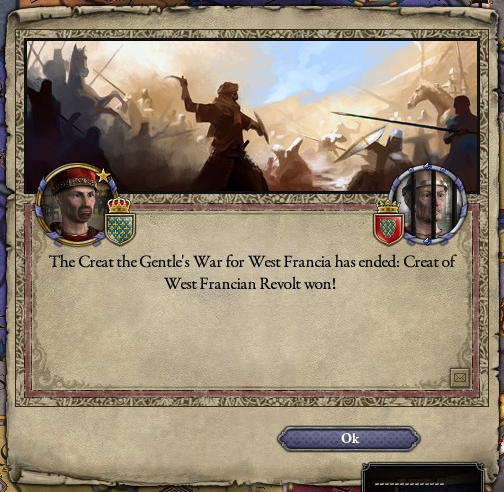  : As with Middle Francia, a sword was put at his throat, and he was given a choice: grant the kingdom to Creat, or lose his head. My uncle was a rational man. He kept his head. : As with Middle Francia, a sword was put at his throat, and he was given a choice: grant the kingdom to Creat, or lose his head. My uncle was a rational man. He kept his head.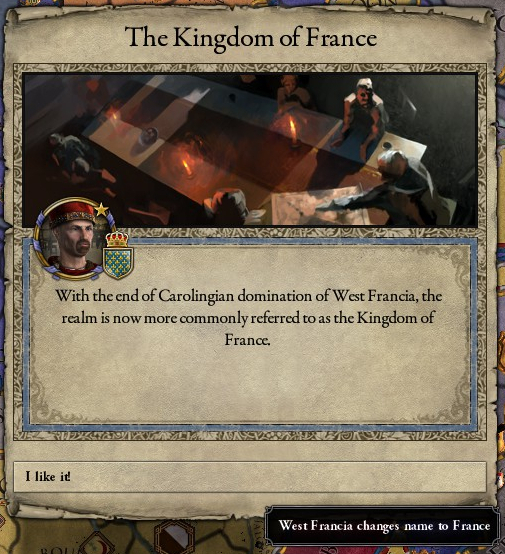  : With no more descendants of Charles the Great on the throne in Paris, the people no longer spoke of Western Francia. The Kingdom of the French, now ruled from Rouen, stood proud. : With no more descendants of Charles the Great on the throne in Paris, the people no longer spoke of Western Francia. The Kingdom of the French, now ruled from Rouen, stood proud.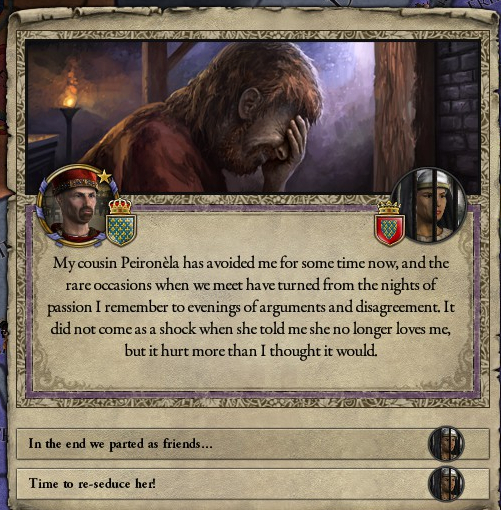  : On his return to Rouen, Creat Le Premier, Roi des Francais, found an unlikely prisoner. Peironela, my uncle's wife, had spent weeks in the cells along with the Karlings. When he entered her cell, she spat in his face. He had her released and sent her away. They never spoke again. : On his return to Rouen, Creat Le Premier, Roi des Francais, found an unlikely prisoner. Peironela, my uncle's wife, had spent weeks in the cells along with the Karlings. When he entered her cell, she spat in his face. He had her released and sent her away. They never spoke again.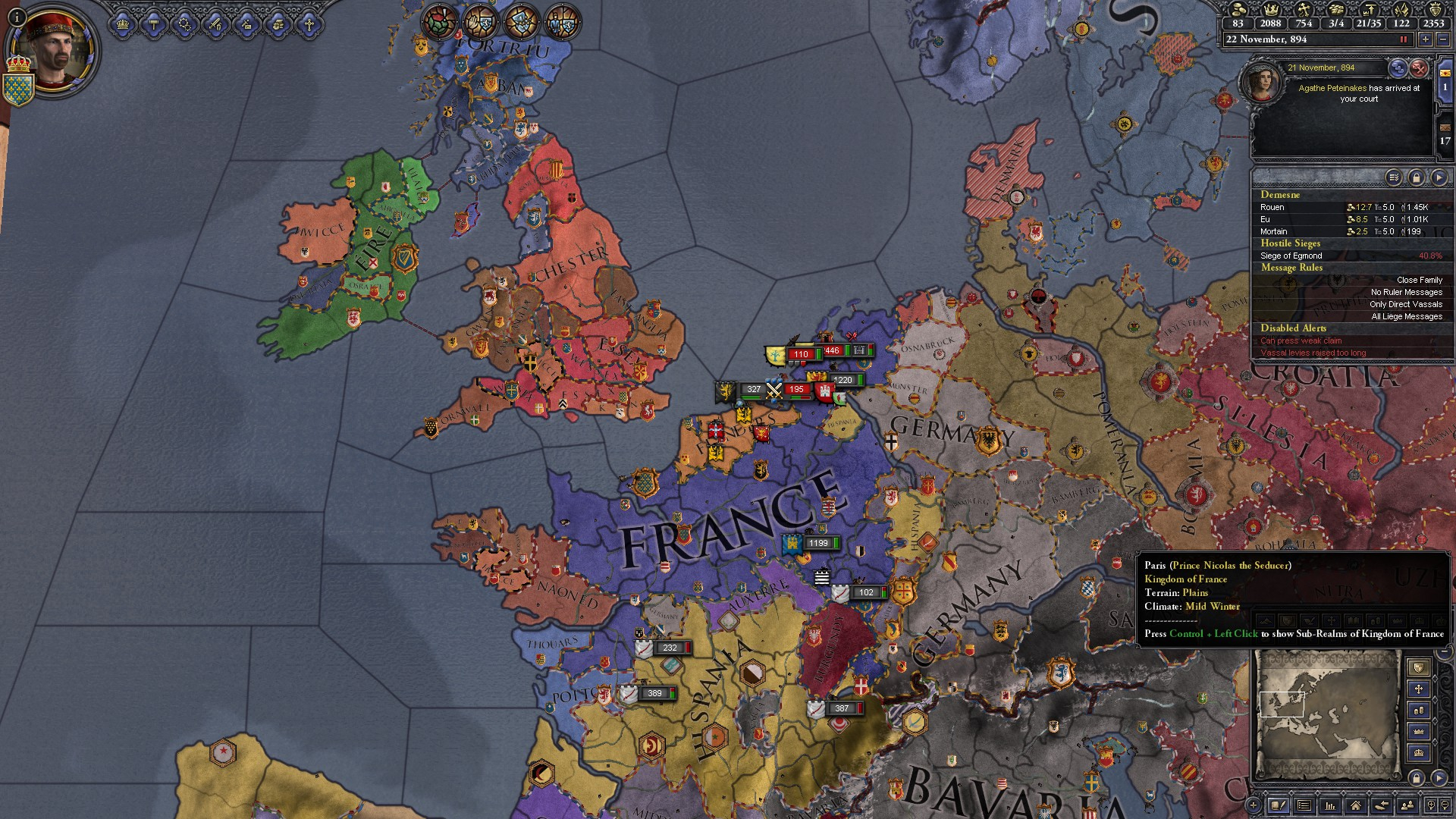  : He sat on his throne, listening to his advisors, planning ahead. There was the biphoric of Koln to the East, still in the hands of Catholic scum. And across the Channel, there was Cantenbury, held by the Duke of Kent, another papist. The Viking raiders pillaged the North, and the Hispanic Muslims bode their time. The Duchesse of Flanders stood apart from the French lands, and claimed herself independent. The crown was won, and now Creat had to prove he was worth it. : He sat on his throne, listening to his advisors, planning ahead. There was the biphoric of Koln to the East, still in the hands of Catholic scum. And across the Channel, there was Cantenbury, held by the Duke of Kent, another papist. The Viking raiders pillaged the North, and the Hispanic Muslims bode their time. The Duchesse of Flanders stood apart from the French lands, and claimed herself independent. The crown was won, and now Creat had to prove he was worth it.Madame de Beaumont look at the captain.  : Is this enough for the day's travels, or must I play Scheherazade longer? : Is this enough for the day's travels, or must I play Scheherazade longer?The captain nods.  : Then I bid you adieu, mon capitaine. : Then I bid you adieu, mon capitaine.Madame de Beaumont makes her way to her hammock, lost in thoughts. She thinks of all left unsaid in her tale. She thinks on Creat's betrayals, his ruthlessness, and breaking her heart. But that is a tale for another day. For another toll.
|
|
|
|
History Update 7 - Looking for Raid Last time we looked at the development and spread of the Cathar faith, and their unfortunate demise. Starting with today, we're going to look at the history of Normandy, mostly in the middle ages. 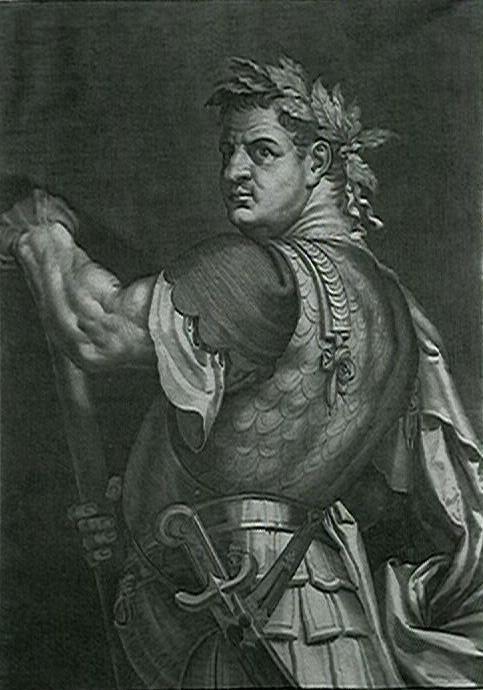 Normandy has a long and proud tradition of getting raided to poo poo. Long before Charlemagne marched on Saxony, Saxon pirates raided Northern Gaul during the crisis of the third century. By the fifth century, Romans lost any semblance of control in the area, and Gaul was invaded by Germanics and Alans from the west and Saxons from the coast. Emperor Majorian sent Aegidius to sort things out, and he led a solid campaign against the local Goths. Eventually, Majorian pissed off the wrong nobles and lost his head. Aegidius told his successor to get bent, and declared an independent kingdom. He established a short-lived dynasty that had a small problem: their lands were next to those of Clovis I. 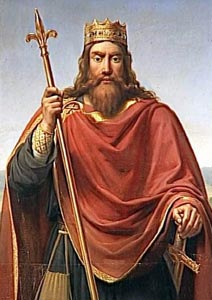 Clovis was a king of the Salian Franks, who was originally a strong ally of Aegidius and his "Roman Province". After using this alliance to secure several victories, he quickly turned on Aegidius' son, Syargius, and shattered his armies. Over the next twenty years, he systematically destroyed all of the other Frank rulers, and secured his dominion over almost the entirety of Gaul. He founded the Merovingian dynasty, and converted to Catholicism, striving to break local Arian beliefs. Clovis' sons each received a piece of his empire, which went over perfectly well with everyone, and caused no problems whatsoever. 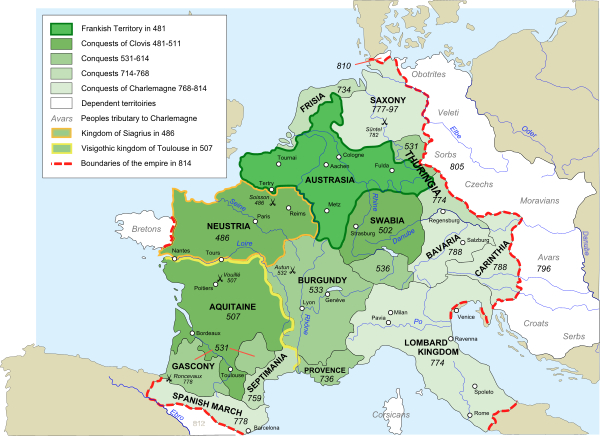 The Merovingians referred to Normandy as the Kingdom of Neustria. They passed it around several times over the next two hundred years, as the Neustrian kings fought with Austrasia. Nothing like a good family squabble. Eventually, the younger son of Charles Martel got a hold of the title. His brother, Carloman, took over Austrasia instead. They technically ruled Francia together. Carloman eventually retired to focus on his religious work, and Peppin the Young became the sole ruler of the Franks. Peppin founded the Carolingian dynasty, who we know as the Karlings. He fought against the Ummayads to the south, as well as the constantly rebelling Aquitane. As with the Merovingians, he had to deal with non-stop rebellions of the Saxons, who wouldn't be pacified until his son came along. 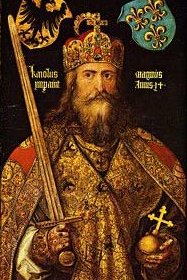 In 768, Peppin's older son, Charles, took the throne of West Francia. His brother, Carloman, took East Francia. The brothers remained rival for a short while, before Carloman conveniently died of natural causes. Charles then basically conquered everything from Western France to Eastern Germany and from the Low Countries to Central Italy. He also founded the Holy Roman Empire, though that's not the focus of this update. On his death, his son Louis the Pious ascended to the throne. He did pretty well, but before his death, he made the same mistake as the Merovingians did, and broke his realm between his three sons. 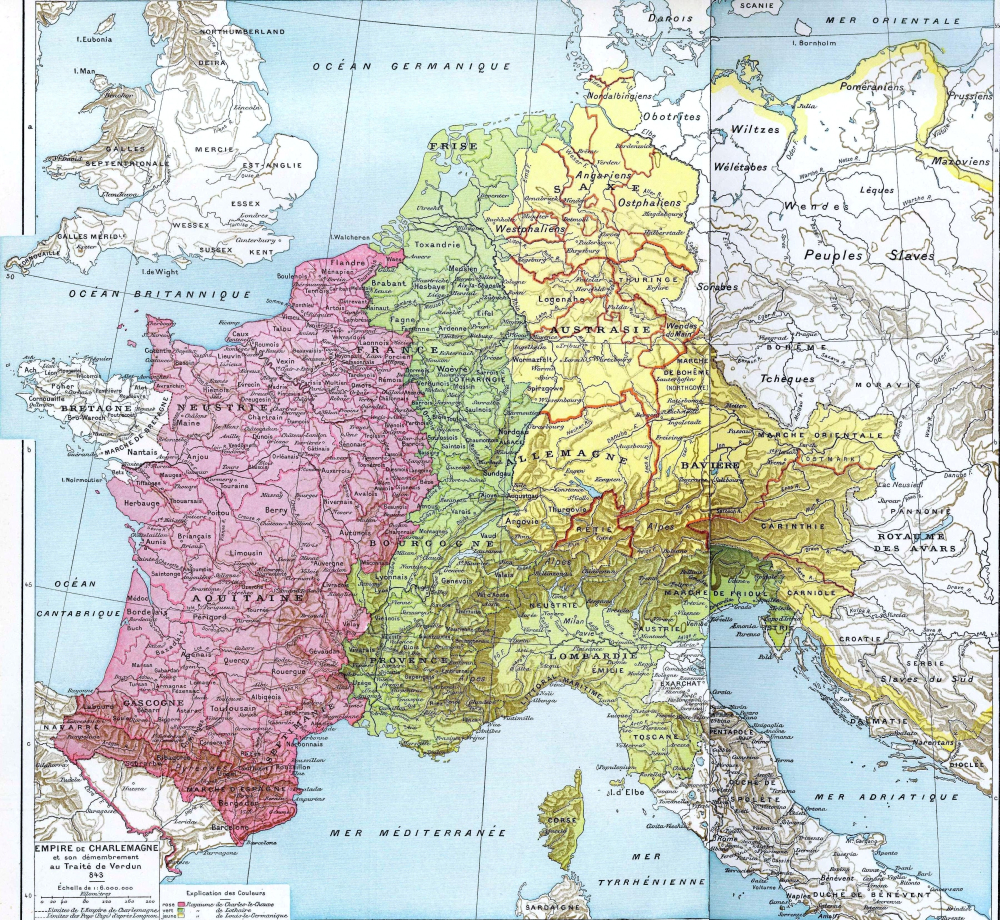 On his death, The Francian empire was broken into West Francia, East Francia, and an ugly piece of poo poo called Lotharingia. This made everyone happy, and did not cause eternal civil war even slightly. While all this nonsense war going, the Viking raids on Norman shores continued. In 845, the vikings, under the command of Ragnarr Lodbrok (sources unclear), even sailed up the Seine and sacked Paris itself. Charles the Bald, the king of West Francia, paid the vikings a lot of gold and silver to gently caress off for a while, while he dealt with his brothers. The raids did not even slow down. 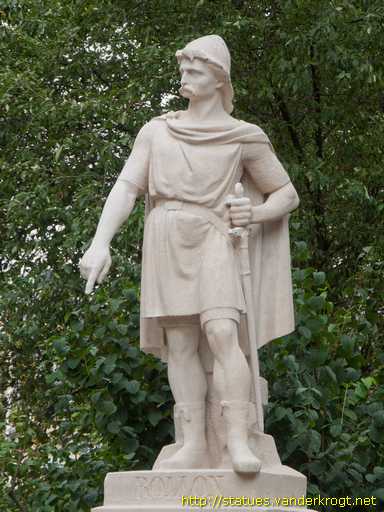 The raids continued until a descendant of Charles, Charles the Simple, was raided by a man named Hrolfr, or Rollo. A raider of great repute, especially in Ireland and Scotland, Hrolfr led a settlement effort along the Norman shores, devasted by centuries of constant raids. Charles led an army that broke the vikings, but instead of throwing them out to sea, he made them a deal: swear fealty, and be named the Duke of Normandy. In effect, this made Normandy a march against viking invasions of West Francia proper. Hrolfr accepted the deal, converted to Christianity, and took the name Robert. Charles didn't last long, and his successor, Rpbert of Neustria was quickly murdered by the vikings. Robert's successor, Rudolph, saw the viking march as a good idea, and granted Rollo Bessin and Maine to do with as he pleased. We will leave the history here today. Join us next time, when we talk about the weird mix of vikings and Franks that eventually turned into Normans, and a dude named William.
|
|
|
|
Film Update 7 - Marriage is a Sham In today's update, we saw teh French court do what it does best: gently caress each other and everyone else. Also, murder. With that in mind, I'm going to recommend a movie that got people to try set fire to the theatre it was played at. 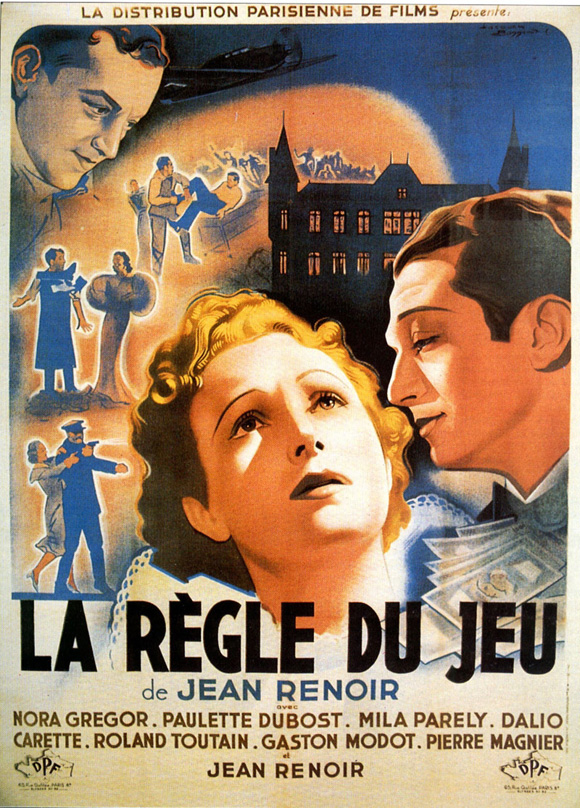 Today's film is Jean Renoir's Rules of the Game (La regle du jeu). This 1939 comedy is a biting satire of French society, aimed both at the bourgeoisie and the common man. Starring Nora Gregor, Marcel Dalio, and Renoir himself, it follows several interconnected affairs and marriages during a hunting trip to a Marquis' estate. Everyone sleeps with everyone else, and immediately talks poo poo about it behind each other's backs. I honestly don't think any line said in a group of more than two people is true in this movie. The help is no better than the aristos they serve, treating each other as entertainment as well. The biggest problem with this film is that it was released in July of 1939. It was the most expensive French production to date, it ran severely overtime, and practically bankrupted Renoir himself. It had a massive release, and people were furious. While Germany was invading Czechoslovakia, and France was mobilizing its troops, here comes this rear end in a top hat, and tells we're are all pieces of poo poo? It didn't go over well. People literally fought during the premiere, and one man tried to set the theatre on fire. The film was banned a few months later, with statements such as "...[the film is] depressing, morbid, immoral [and] having an undesirable influence over the young" and "we are especially anxious to avoid representations of our country, our traditions, and our race that changes its character, lie about it, and deform it through the prism of an artistic individual who is often original but not always sound". In May, Germany invaded. 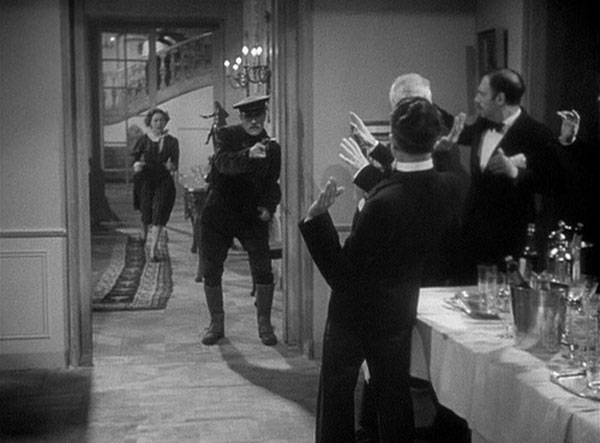 You can easily see why the film had such a reception. People were anxious, war was brewing, and they weren't big fans of such an unflattering portrayal. That does not make it a bad film. Hell, it's fantastic. It's funny, it's very well shot, and its satire is very on point. Renoir's portrayal of a big, funny dude that secretely hates himself is also great. So if you don't mind old black and white movies (and a lot of animal cruelty, the killed hundreds of rabbits and birds for the hunting scenes), definitely check it out.
|
|
|
|
I'm going to leave the Catholic holy site vote open for another day or two, so make your voice be heard, etc.
|
|
|
|
A take Köln, then proceed to show the superiority of the Cathar faith by throwing out the Muslims
|
|
|
|

|
| # ? May 16, 2024 17:46 |
|
As long as you keep writing this so well, whatever gets invaded will be a treat. I am really enjoying seeing Cathars go places aside from being exterminated under my incompetent rule
|
|
|




